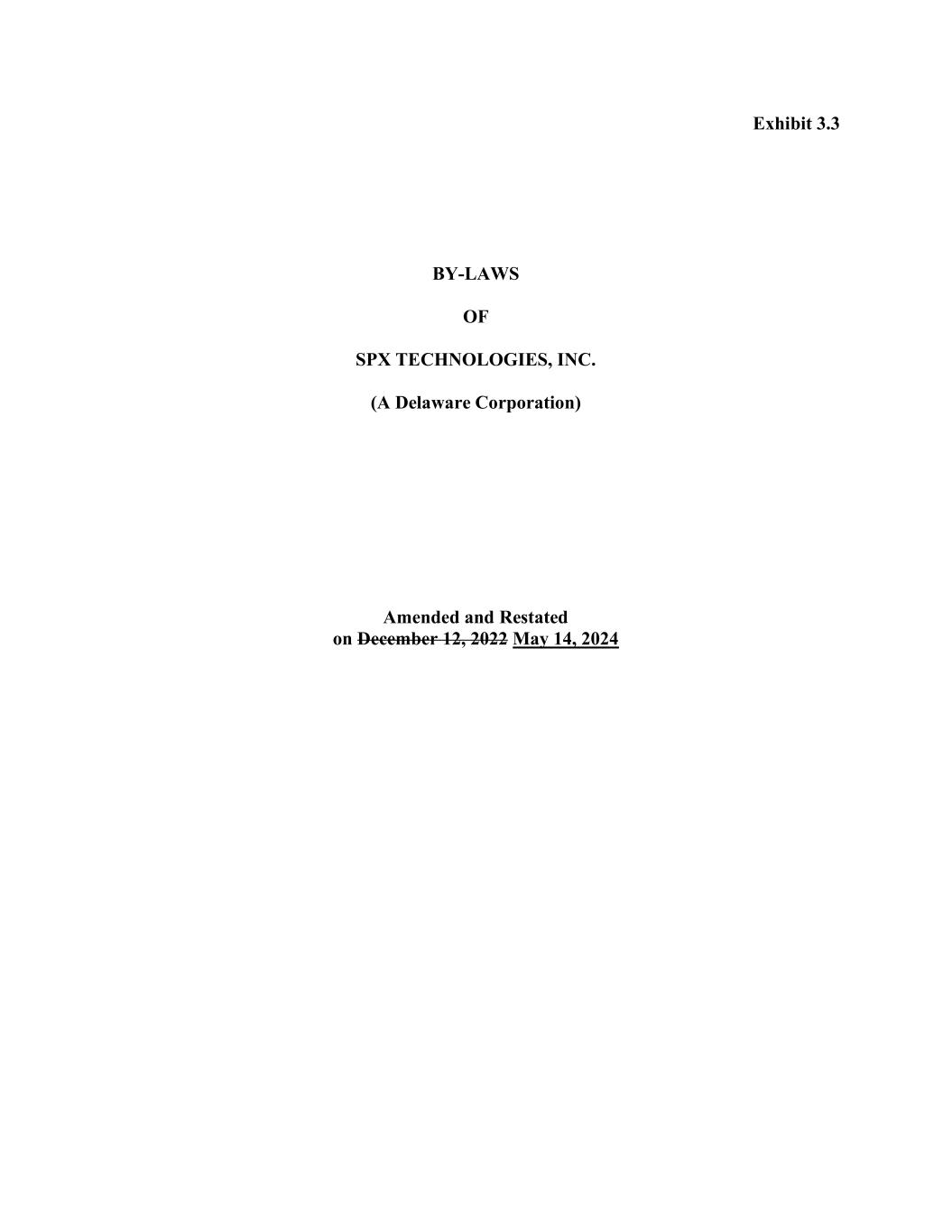
Exhibit 3.3 BY-LAWS OF SPX TECHNOLOGIES, INC. (A Delaware Corporation) Amended and Restated on December 12, 2022 May 14, 2024
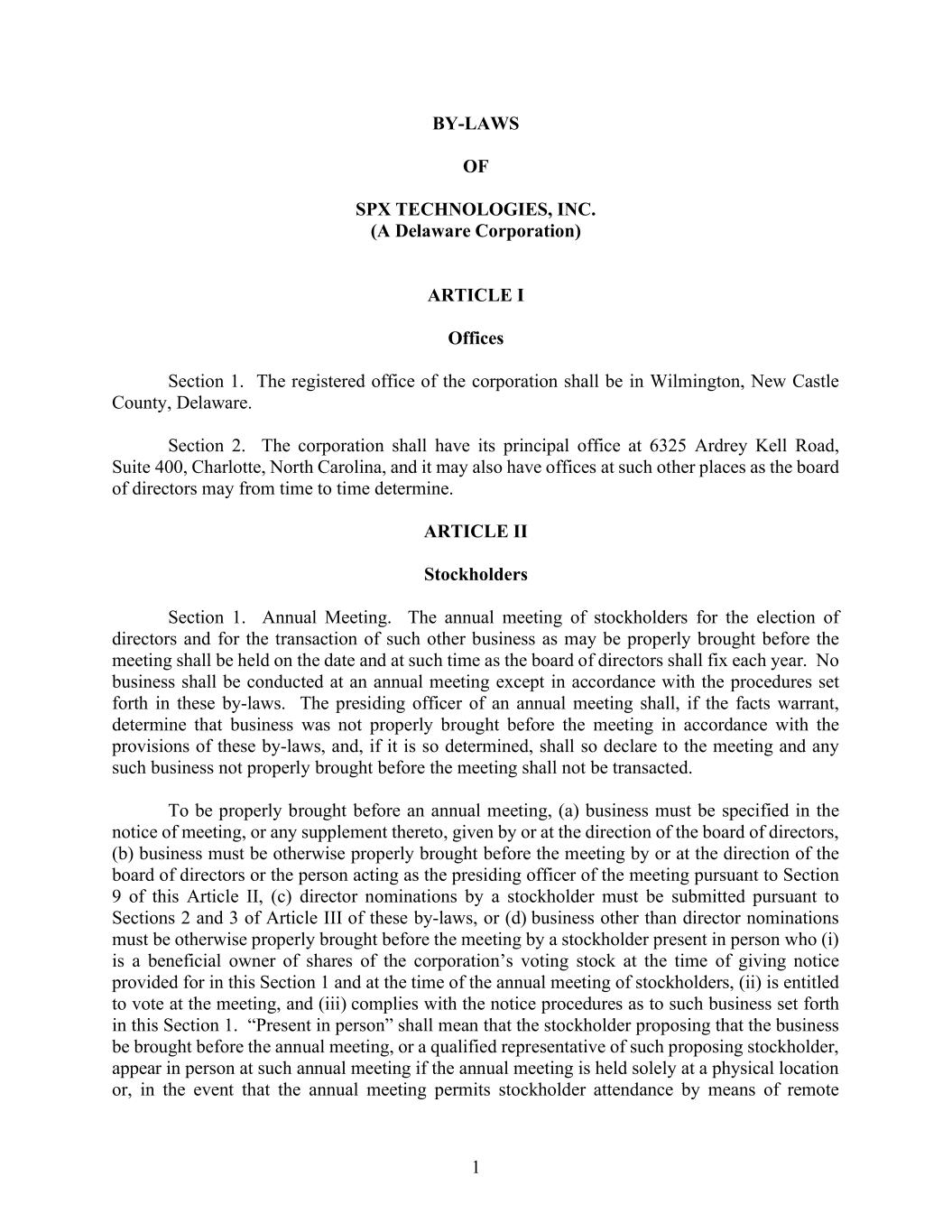
1 BY-LAWS OF SPX TECHNOLOGIES, INC. (A Delaware Corporation) ARTICLE I Offices Section 1. The registered office of the corporation shall be in Wilmington, New Castle County, Delaware. Section 2. The corporation shall have its principal office at 6325 Ardrey Kell Road, Suite 400, Charlotte, North Carolina, and it may also have offices at such other places as the board of directors may from time to time determine. ARTICLE II Stockholders Section 1. Annual Meeting. The annual meeting of stockholders for the election of directors and for the transaction of such other business as may be properly brought before the meeting shall be held on the date and at such time as the board of directors shall fix each year. No business shall be conducted at an annual meeting except in accordance with the procedures set forth in these by-laws. The presiding officer of an annual meeting shall, if the facts warrant, determine that business was not properly brought before the meeting in accordance with the provisions of these by-laws, and, if it is so determined, shall so declare to the meeting and any such business not properly brought before the meeting shall not be transacted. To be properly brought before an annual meeting, (a) business must be specified in the notice of meeting, or any supplement thereto, given by or at the direction of the board of directors, (b) business must be otherwise properly brought before the meeting by or at the direction of the board of directors or the person acting as the presiding officer of the meeting pursuant to Section 9 of this Article II, (c) director nominations by a stockholder must be submitted pursuant to Sections 2 and 3 of Article III of these by-laws, or (d) business other than director nominations must be otherwise properly brought before the meeting by a stockholder present in person who (i) is a beneficial owner of shares of the corporation’s voting stock at the time of giving notice provided for in this Section 1 and at the time of the annual meeting of stockholders, (ii) is entitled to vote at the meeting, and (iii) complies with the notice procedures as to such business set forth in this Section 1. “Present in person” shall mean that the stockholder proposing that the business be brought before the annual meeting, or a qualified representative of such proposing stockholder, appear in person at such annual meeting if the annual meeting is held solely at a physical location or, in the event that the annual meeting permits stockholder attendance by means of remote
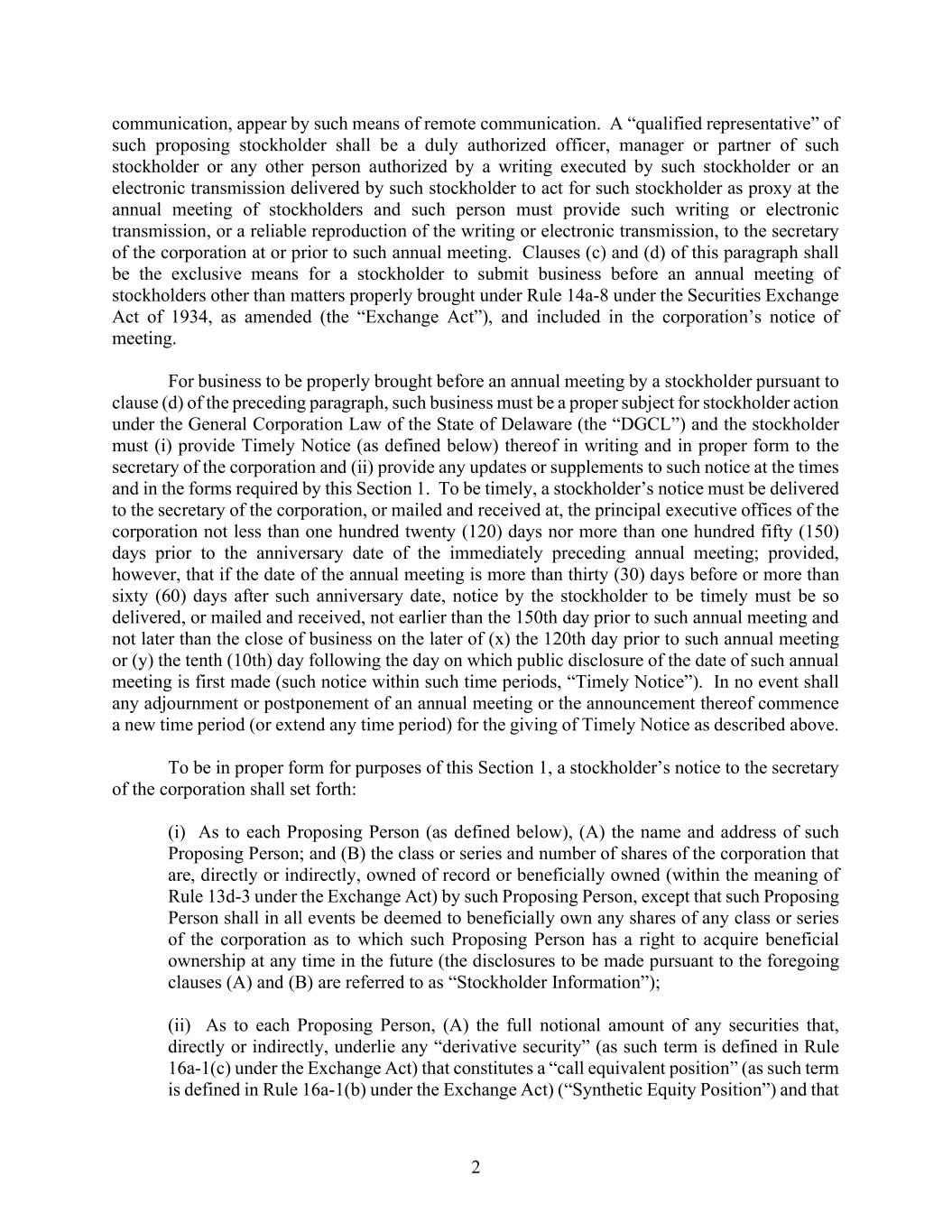
2 communication, appear by such means of remote communication. A “qualified representative” of such proposing stockholder shall be a duly authorized officer, manager or partner of such stockholder or any other person authorized by a writing executed by such stockholder or an electronic transmission delivered by such stockholder to act for such stockholder as proxy at the annual meeting of stockholders and such person must provide such writing or electronic transmission, or a reliable reproduction of the writing or electronic transmission, to the secretary of the corporation at or prior to such annual meeting. Clauses (c) and (d) of this paragraph shall be the exclusive means for a stockholder to submit business before an annual meeting of stockholders other than matters properly brought under Rule 14a-8 under the Securities Exchange Act of 1934, as amended (the “Exchange Act”), and included in the corporation’s notice of meeting. For business to be properly brought before an annual meeting by a stockholder pursuant to clause (d) of the preceding paragraph, such business must be a proper subject for stockholder action under the General Corporation Law of the State of Delaware (the “DGCL”) and the stockholder must (i) provide Timely Notice (as defined below) thereof in writing and in proper form to the secretary of the corporation and (ii) provide any updates or supplements to such notice at the times and in the forms required by this Section 1. To be timely, a stockholder’s notice must be delivered to the secretary of the corporation, or mailed and received at, the principal executive offices of the corporation not less than one hundred twenty (120) days nor more than one hundred fifty (150) days prior to the anniversary date of the immediately preceding annual meeting; provided, however, that if the date of the annual meeting is more than thirty (30) days before or more than sixty (60) days after such anniversary date, notice by the stockholder to be timely must be so delivered, or mailed and received, not earlier than the 150th day prior to such annual meeting and not later than the close of business on the later of (x) the 120th day prior to such annual meeting or (y) the tenth (10th) day following the day on which public disclosure of the date of such annual meeting is first made (such notice within such time periods, “Timely Notice”). In no event shall any adjournment or postponement of an annual meeting or the announcement thereof commence a new time period (or extend any time period) for the giving of Timely Notice as described above. To be in proper form for purposes of this Section 1, a stockholder’s notice to the secretary of the corporation shall set forth: (i) As to each Proposing Person (as defined below), (A) the name and address of such Proposing Person; and (B) the class or series and number of shares of the corporation that are, directly or indirectly, owned of record or beneficially owned (within the meaning of Rule 13d-3 under the Exchange Act) by such Proposing Person, except that such Proposing Person shall in all events be deemed to beneficially own any shares of any class or series of the corporation as to which such Proposing Person has a right to acquire beneficial ownership at any time in the future (the disclosures to be made pursuant to the foregoing clauses (A) and (B) are referred to as “Stockholder Information”); (ii) As to each Proposing Person, (A) the full notional amount of any securities that, directly or indirectly, underlie any “derivative security” (as such term is defined in Rule 16a-1(c) under the Exchange Act) that constitutes a “call equivalent position” (as such term is defined in Rule 16a-1(b) under the Exchange Act) (“Synthetic Equity Position”) and that
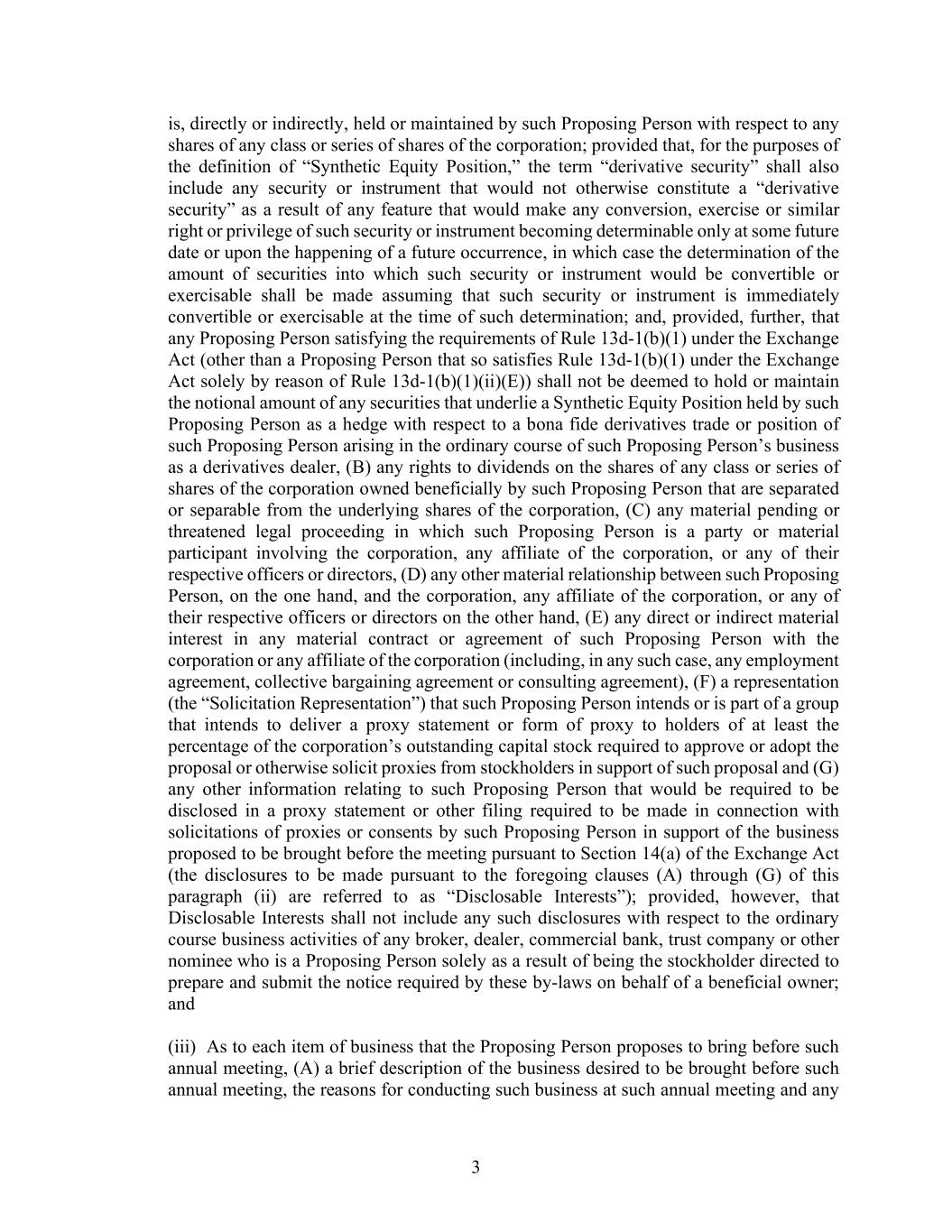
3 is, directly or indirectly, held or maintained by such Proposing Person with respect to any shares of any class or series of shares of the corporation; provided that, for the purposes of the definition of “Synthetic Equity Position,” the term “derivative security” shall also include any security or instrument that would not otherwise constitute a “derivative security” as a result of any feature that would make any conversion, exercise or similar right or privilege of such security or instrument becoming determinable only at some future date or upon the happening of a future occurrence, in which case the determination of the amount of securities into which such security or instrument would be convertible or exercisable shall be made assuming that such security or instrument is immediately convertible or exercisable at the time of such determination; and, provided, further, that any Proposing Person satisfying the requirements of Rule 13d-1(b)(1) under the Exchange Act (other than a Proposing Person that so satisfies Rule 13d-1(b)(1) under the Exchange Act solely by reason of Rule 13d-1(b)(1)(ii)(E)) shall not be deemed to hold or maintain the notional amount of any securities that underlie a Synthetic Equity Position held by such Proposing Person as a hedge with respect to a bona fide derivatives trade or position of such Proposing Person arising in the ordinary course of such Proposing Person’s business as a derivatives dealer, (B) any rights to dividends on the shares of any class or series of shares of the corporation owned beneficially by such Proposing Person that are separated or separable from the underlying shares of the corporation, (C) any material pending or threatened legal proceeding in which such Proposing Person is a party or material participant involving the corporation, any affiliate of the corporation, or any of their respective officers or directors, (D) any other material relationship between such Proposing Person, on the one hand, and the corporation, any affiliate of the corporation, or any of their respective officers or directors on the other hand, (E) any direct or indirect material interest in any material contract or agreement of such Proposing Person with the corporation or any affiliate of the corporation (including, in any such case, any employment agreement, collective bargaining agreement or consulting agreement), (F) a representation (the “Solicitation Representation”) that such Proposing Person intends or is part of a group that intends to deliver a proxy statement or form of proxy to holders of at least the percentage of the corporation’s outstanding capital stock required to approve or adopt the proposal or otherwise solicit proxies from stockholders in support of such proposal and (G) any other information relating to such Proposing Person that would be required to be disclosed in a proxy statement or other filing required to be made in connection with solicitations of proxies or consents by such Proposing Person in support of the business proposed to be brought before the meeting pursuant to Section 14(a) of the Exchange Act (the disclosures to be made pursuant to the foregoing clauses (A) through (G) of this paragraph (ii) are referred to as “Disclosable Interests”); provided, however, that Disclosable Interests shall not include any such disclosures with respect to the ordinary course business activities of any broker, dealer, commercial bank, trust company or other nominee who is a Proposing Person solely as a result of being the stockholder directed to prepare and submit the notice required by these by-laws on behalf of a beneficial owner; and (iii) As to each item of business that the Proposing Person proposes to bring before such annual meeting, (A) a brief description of the business desired to be brought before such annual meeting, the reasons for conducting such business at such annual meeting and any
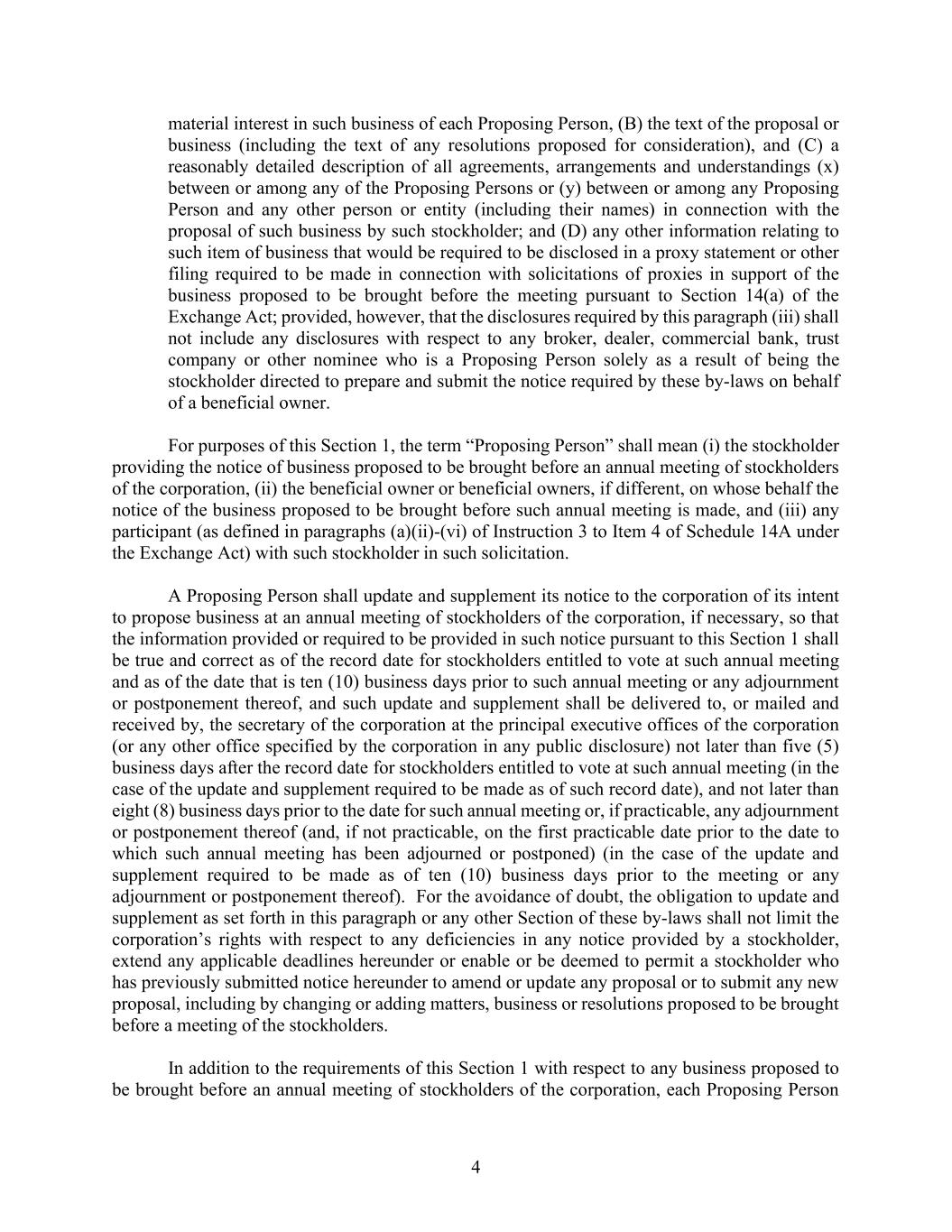
4 material interest in such business of each Proposing Person, (B) the text of the proposal or business (including the text of any resolutions proposed for consideration), and (C) a reasonably detailed description of all agreements, arrangements and understandings (x) between or among any of the Proposing Persons or (y) between or among any Proposing Person and any other person or entity (including their names) in connection with the proposal of such business by such stockholder; and (D) any other information relating to such item of business that would be required to be disclosed in a proxy statement or other filing required to be made in connection with solicitations of proxies in support of the business proposed to be brought before the meeting pursuant to Section 14(a) of the Exchange Act; provided, however, that the disclosures required by this paragraph (iii) shall not include any disclosures with respect to any broker, dealer, commercial bank, trust company or other nominee who is a Proposing Person solely as a result of being the stockholder directed to prepare and submit the notice required by these by-laws on behalf of a beneficial owner. For purposes of this Section 1, the term “Proposing Person” shall mean (i) the stockholder providing the notice of business proposed to be brought before an annual meeting of stockholders of the corporation, (ii) the beneficial owner or beneficial owners, if different, on whose behalf the notice of the business proposed to be brought before such annual meeting is made, and (iii) any participant (as defined in paragraphs (a)(ii)-(vi) of Instruction 3 to Item 4 of Schedule 14A under the Exchange Act) with such stockholder in such solicitation. A Proposing Person shall update and supplement its notice to the corporation of its intent to propose business at an annual meeting of stockholders of the corporation, if necessary, so that the information provided or required to be provided in such notice pursuant to this Section 1 shall be true and correct as of the record date for stockholders entitled to vote at such annual meeting and as of the date that is ten (10) business days prior to such annual meeting or any adjournment or postponement thereof, and such update and supplement shall be delivered to, or mailed and received by, the secretary of the corporation at the principal executive offices of the corporation (or any other office specified by the corporation in any public disclosure) not later than five (5) business days after the record date for stockholders entitled to vote at such annual meeting (in the case of the update and supplement required to be made as of such record date), and not later than eight (8) business days prior to the date for such annual meeting or, if practicable, any adjournment or postponement thereof (and, if not practicable, on the first practicable date prior to the date to which such annual meeting has been adjourned or postponed) (in the case of the update and supplement required to be made as of ten (10) business days prior to the meeting or any adjournment or postponement thereof). For the avoidance of doubt, the obligation to update and supplement as set forth in this paragraph or any other Section of these by-laws shall not limit the corporation’s rights with respect to any deficiencies in any notice provided by a stockholder, extend any applicable deadlines hereunder or enable or be deemed to permit a stockholder who has previously submitted notice hereunder to amend or update any proposal or to submit any new proposal, including by changing or adding matters, business or resolutions proposed to be brought before a meeting of the stockholders. In addition to the requirements of this Section 1 with respect to any business proposed to be brought before an annual meeting of stockholders of the corporation, each Proposing Person
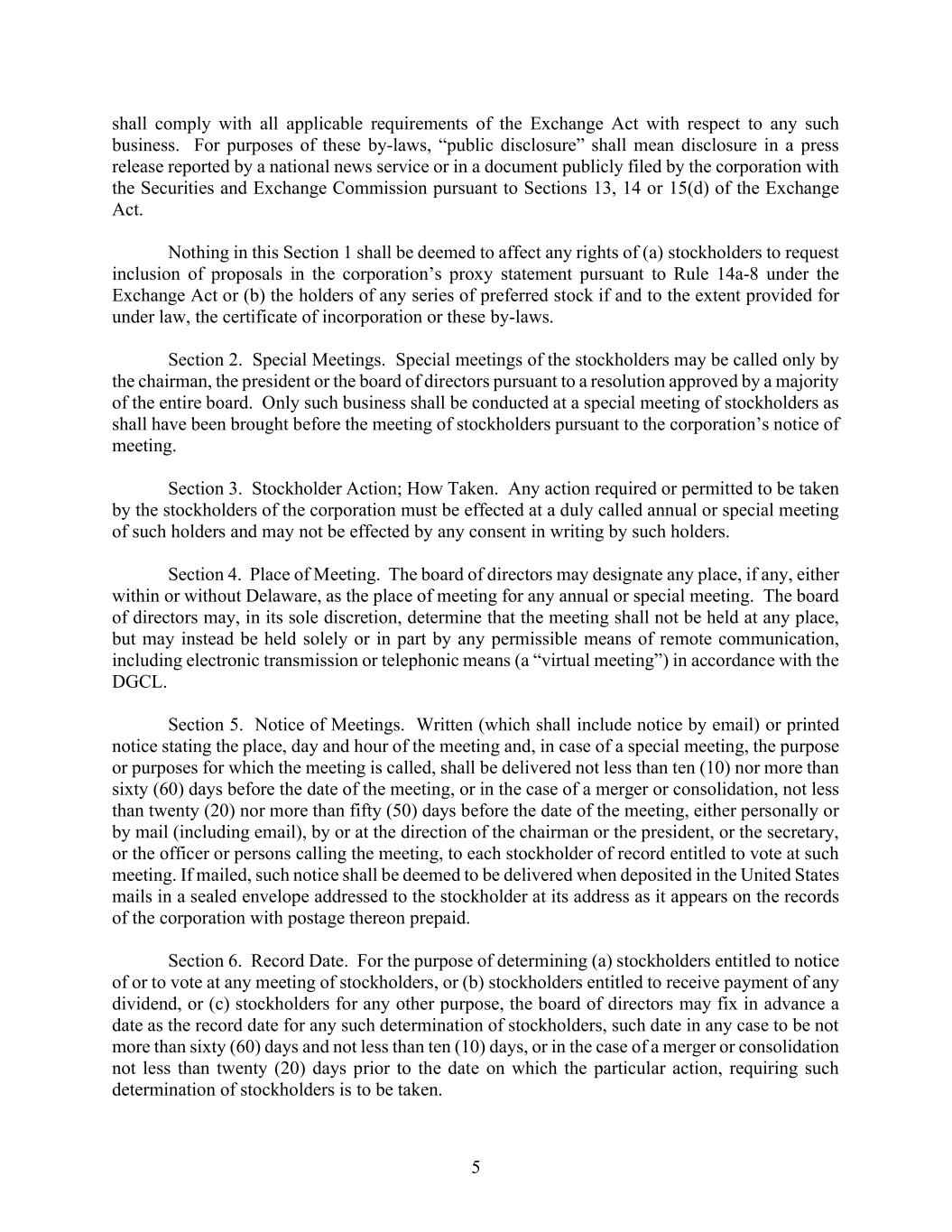
5 shall comply with all applicable requirements of the Exchange Act with respect to any such business. For purposes of these by-laws, “public disclosure” shall mean disclosure in a press release reported by a national news service or in a document publicly filed by the corporation with the Securities and Exchange Commission pursuant to Sections 13, 14 or 15(d) of the Exchange Act. Nothing in this Section 1 shall be deemed to affect any rights of (a) stockholders to request inclusion of proposals in the corporation’s proxy statement pursuant to Rule 14a-8 under the Exchange Act or (b) the holders of any series of preferred stock if and to the extent provided for under law, the certificate of incorporation or these by-laws. Section 2. Special Meetings. Special meetings of the stockholders may be called only by the chairman, the president or the board of directors pursuant to a resolution approved by a majority of the entire board. Only such business shall be conducted at a special meeting of stockholders as shall have been brought before the meeting of stockholders pursuant to the corporation’s notice of meeting. Section 3. Stockholder Action; How Taken. Any action required or permitted to be taken by the stockholders of the corporation must be effected at a duly called annual or special meeting of such holders and may not be effected by any consent in writing by such holders. Section 4. Place of Meeting. The board of directors may designate any place, if any, either within or without Delaware, as the place of meeting for any annual or special meeting. The board of directors may, in its sole discretion, determine that the meeting shall not be held at any place, but may instead be held solely or in part by any permissible means of remote communication, including electronic transmission or telephonic means (a “virtual meeting”) in accordance with the DGCL. Section 5. Notice of Meetings. Written (which shall include notice by email) or printed notice stating the place, day and hour of the meeting and, in case of a special meeting, the purpose or purposes for which the meeting is called, shall be delivered not less than ten (10) nor more than sixty (60) days before the date of the meeting, or in the case of a merger or consolidation, not less than twenty (20) nor more than fifty (50) days before the date of the meeting, either personally or by mail (including email), by or at the direction of the chairman or the president, or the secretary, or the officer or persons calling the meeting, to each stockholder of record entitled to vote at such meeting. If mailed, such notice shall be deemed to be delivered when deposited in the United States mails in a sealed envelope addressed to the stockholder at its address as it appears on the records of the corporation with postage thereon prepaid. Section 6. Record Date. For the purpose of determining (a) stockholders entitled to notice of or to vote at any meeting of stockholders, or (b) stockholders entitled to receive payment of any dividend, or (c) stockholders for any other purpose, the board of directors may fix in advance a date as the record date for any such determination of stockholders, such date in any case to be not more than sixty (60) days and not less than ten (10) days, or in the case of a merger or consolidation not less than twenty (20) days prior to the date on which the particular action, requiring such determination of stockholders is to be taken.
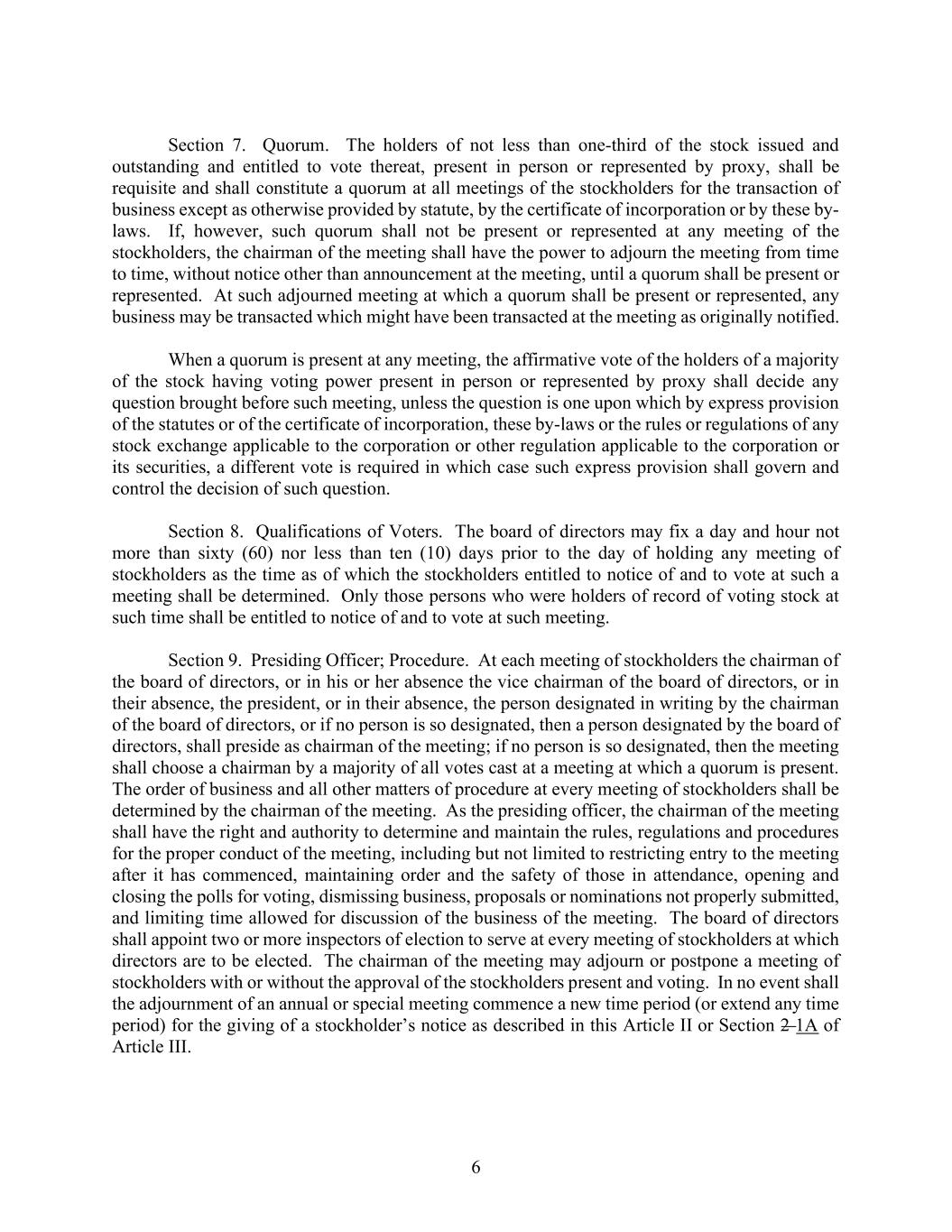
6 Section 7. Quorum. The holders of not less than one-third of the stock issued and outstanding and entitled to vote thereat, present in person or represented by proxy, shall be requisite and shall constitute a quorum at all meetings of the stockholders for the transaction of business except as otherwise provided by statute, by the certificate of incorporation or by these by- laws. If, however, such quorum shall not be present or represented at any meeting of the stockholders, the chairman of the meeting shall have the power to adjourn the meeting from time to time, without notice other than announcement at the meeting, until a quorum shall be present or represented. At such adjourned meeting at which a quorum shall be present or represented, any business may be transacted which might have been transacted at the meeting as originally notified. When a quorum is present at any meeting, the affirmative vote of the holders of a majority of the stock having voting power present in person or represented by proxy shall decide any question brought before such meeting, unless the question is one upon which by express provision of the statutes or of the certificate of incorporation, these by-laws or the rules or regulations of any stock exchange applicable to the corporation or other regulation applicable to the corporation or its securities, a different vote is required in which case such express provision shall govern and control the decision of such question. Section 8. Qualifications of Voters. The board of directors may fix a day and hour not more than sixty (60) nor less than ten (10) days prior to the day of holding any meeting of stockholders as the time as of which the stockholders entitled to notice of and to vote at such a meeting shall be determined. Only those persons who were holders of record of voting stock at such time shall be entitled to notice of and to vote at such meeting. Section 9. Presiding Officer; Procedure. At each meeting of stockholders the chairman of the board of directors, or in his or her absence the vice chairman of the board of directors, or in their absence, the president, or in their absence, the person designated in writing by the chairman of the board of directors, or if no person is so designated, then a person designated by the board of directors, shall preside as chairman of the meeting; if no person is so designated, then the meeting shall choose a chairman by a majority of all votes cast at a meeting at which a quorum is present. The order of business and all other matters of procedure at every meeting of stockholders shall be determined by the chairman of the meeting. As the presiding officer, the chairman of the meeting shall have the right and authority to determine and maintain the rules, regulations and procedures for the proper conduct of the meeting, including but not limited to restricting entry to the meeting after it has commenced, maintaining order and the safety of those in attendance, opening and closing the polls for voting, dismissing business, proposals or nominations not properly submitted, and limiting time allowed for discussion of the business of the meeting. The board of directors shall appoint two or more inspectors of election to serve at every meeting of stockholders at which directors are to be elected. The chairman of the meeting may adjourn or postpone a meeting of stockholders with or without the approval of the stockholders present and voting. In no event shall the adjournment of an annual or special meeting commence a new time period (or extend any time period) for the giving of a stockholder’s notice as described in this Article II or Section 2 1A of Article III.
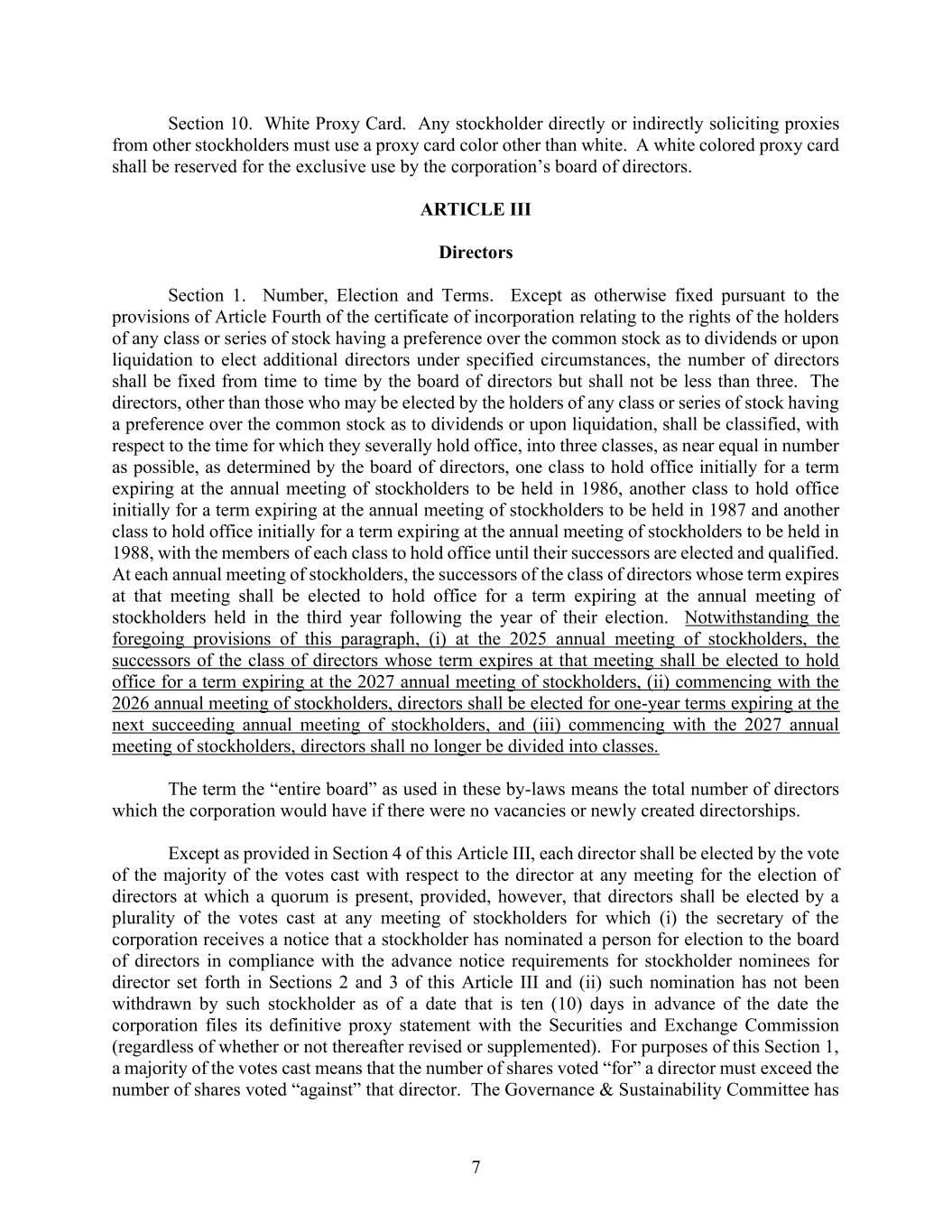
7 Section 10. White Proxy Card. Any stockholder directly or indirectly soliciting proxies from other stockholders must use a proxy card color other than white. A white colored proxy card shall be reserved for the exclusive use by the corporation’s board of directors. ARTICLE III Directors Section 1. Number, Election and Terms. Except as otherwise fixed pursuant to the provisions of Article Fourth of the certificate of incorporation relating to the rights of the holders of any class or series of stock having a preference over the common stock as to dividends or upon liquidation to elect additional directors under specified circumstances, the number of directors shall be fixed from time to time by the board of directors but shall not be less than three. The directors, other than those who may be elected by the holders of any class or series of stock having a preference over the common stock as to dividends or upon liquidation, shall be classified, with respect to the time for which they severally hold office, into three classes, as near equal in number as possible, as determined by the board of directors, one class to hold office initially for a term expiring at the annual meeting of stockholders to be held in 1986, another class to hold office initially for a term expiring at the annual meeting of stockholders to be held in 1987 and another class to hold office initially for a term expiring at the annual meeting of stockholders to be held in 1988, with the members of each class to hold office until their successors are elected and qualified. At each annual meeting of stockholders, the successors of the class of directors whose term expires at that meeting shall be elected to hold office for a term expiring at the annual meeting of stockholders held in the third year following the year of their election. Notwithstanding the foregoing provisions of this paragraph, (i) at the 2025 annual meeting of stockholders, the successors of the class of directors whose term expires at that meeting shall be elected to hold office for a term expiring at the 2027 annual meeting of stockholders, (ii) commencing with the 2026 annual meeting of stockholders, directors shall be elected for one-year terms expiring at the next succeeding annual meeting of stockholders, and (iii) commencing with the 2027 annual meeting of stockholders, directors shall no longer be divided into classes. The term the “entire board” as used in these by-laws means the total number of directors which the corporation would have if there were no vacancies or newly created directorships. Except as provided in Section 4 of this Article III, each director shall be elected by the vote of the majority of the votes cast with respect to the director at any meeting for the election of directors at which a quorum is present, provided, however, that directors shall be elected by a plurality of the votes cast at any meeting of stockholders for which (i) the secretary of the corporation receives a notice that a stockholder has nominated a person for election to the board of directors in compliance with the advance notice requirements for stockholder nominees for director set forth in Sections 2 and 3 of this Article III and (ii) such nomination has not been withdrawn by such stockholder as of a date that is ten (10) days in advance of the date the corporation files its definitive proxy statement with the Securities and Exchange Commission (regardless of whether or not thereafter revised or supplemented). For purposes of this Section 1, a majority of the votes cast means that the number of shares voted “for” a director must exceed the number of shares voted “against” that director. The Governance & Sustainability Committee has
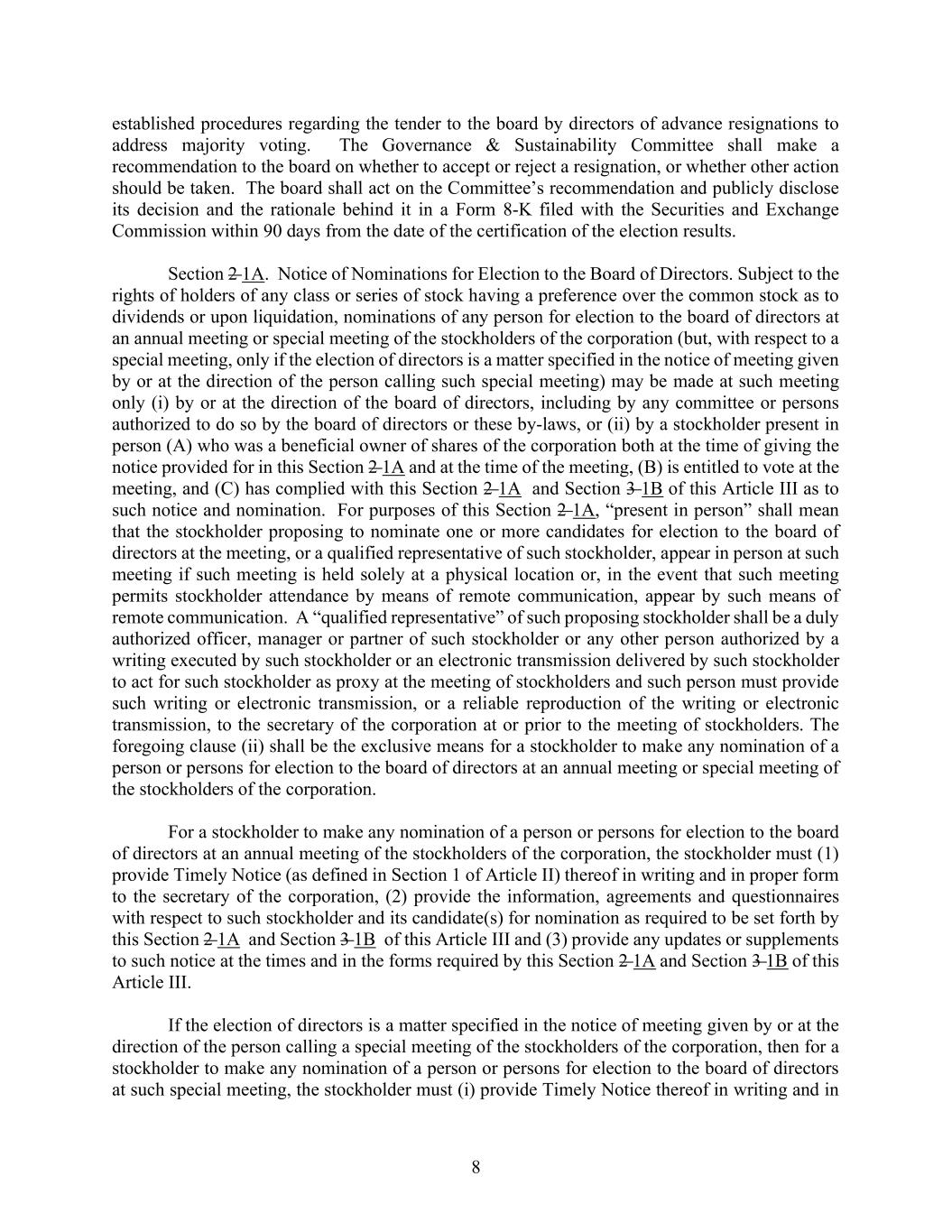
8 established procedures regarding the tender to the board by directors of advance resignations to address majority voting. The Governance & Sustainability Committee shall make a recommendation to the board on whether to accept or reject a resignation, or whether other action should be taken. The board shall act on the Committee’s recommendation and publicly disclose its decision and the rationale behind it in a Form 8-K filed with the Securities and Exchange Commission within 90 days from the date of the certification of the election results. Section 2 1A. Notice of Nominations for Election to the Board of Directors. Subject to the rights of holders of any class or series of stock having a preference over the common stock as to dividends or upon liquidation, nominations of any person for election to the board of directors at an annual meeting or special meeting of the stockholders of the corporation (but, with respect to a special meeting, only if the election of directors is a matter specified in the notice of meeting given by or at the direction of the person calling such special meeting) may be made at such meeting only (i) by or at the direction of the board of directors, including by any committee or persons authorized to do so by the board of directors or these by-laws, or (ii) by a stockholder present in person (A) who was a beneficial owner of shares of the corporation both at the time of giving the notice provided for in this Section 2 1A and at the time of the meeting, (B) is entitled to vote at the meeting, and (C) has complied with this Section 2 1A and Section 3 1B of this Article III as to such notice and nomination. For purposes of this Section 2 1A, “present in person” shall mean that the stockholder proposing to nominate one or more candidates for election to the board of directors at the meeting, or a qualified representative of such stockholder, appear in person at such meeting if such meeting is held solely at a physical location or, in the event that such meeting permits stockholder attendance by means of remote communication, appear by such means of remote communication. A “qualified representative” of such proposing stockholder shall be a duly authorized officer, manager or partner of such stockholder or any other person authorized by a writing executed by such stockholder or an electronic transmission delivered by such stockholder to act for such stockholder as proxy at the meeting of stockholders and such person must provide such writing or electronic transmission, or a reliable reproduction of the writing or electronic transmission, to the secretary of the corporation at or prior to the meeting of stockholders. The foregoing clause (ii) shall be the exclusive means for a stockholder to make any nomination of a person or persons for election to the board of directors at an annual meeting or special meeting of the stockholders of the corporation. For a stockholder to make any nomination of a person or persons for election to the board of directors at an annual meeting of the stockholders of the corporation, the stockholder must (1) provide Timely Notice (as defined in Section 1 of Article II) thereof in writing and in proper form to the secretary of the corporation, (2) provide the information, agreements and questionnaires with respect to such stockholder and its candidate(s) for nomination as required to be set forth by this Section 2 1A and Section 3 1B of this Article III and (3) provide any updates or supplements to such notice at the times and in the forms required by this Section 2 1A and Section 3 1B of this Article III. If the election of directors is a matter specified in the notice of meeting given by or at the direction of the person calling a special meeting of the stockholders of the corporation, then for a stockholder to make any nomination of a person or persons for election to the board of directors at such special meeting, the stockholder must (i) provide Timely Notice thereof in writing and in
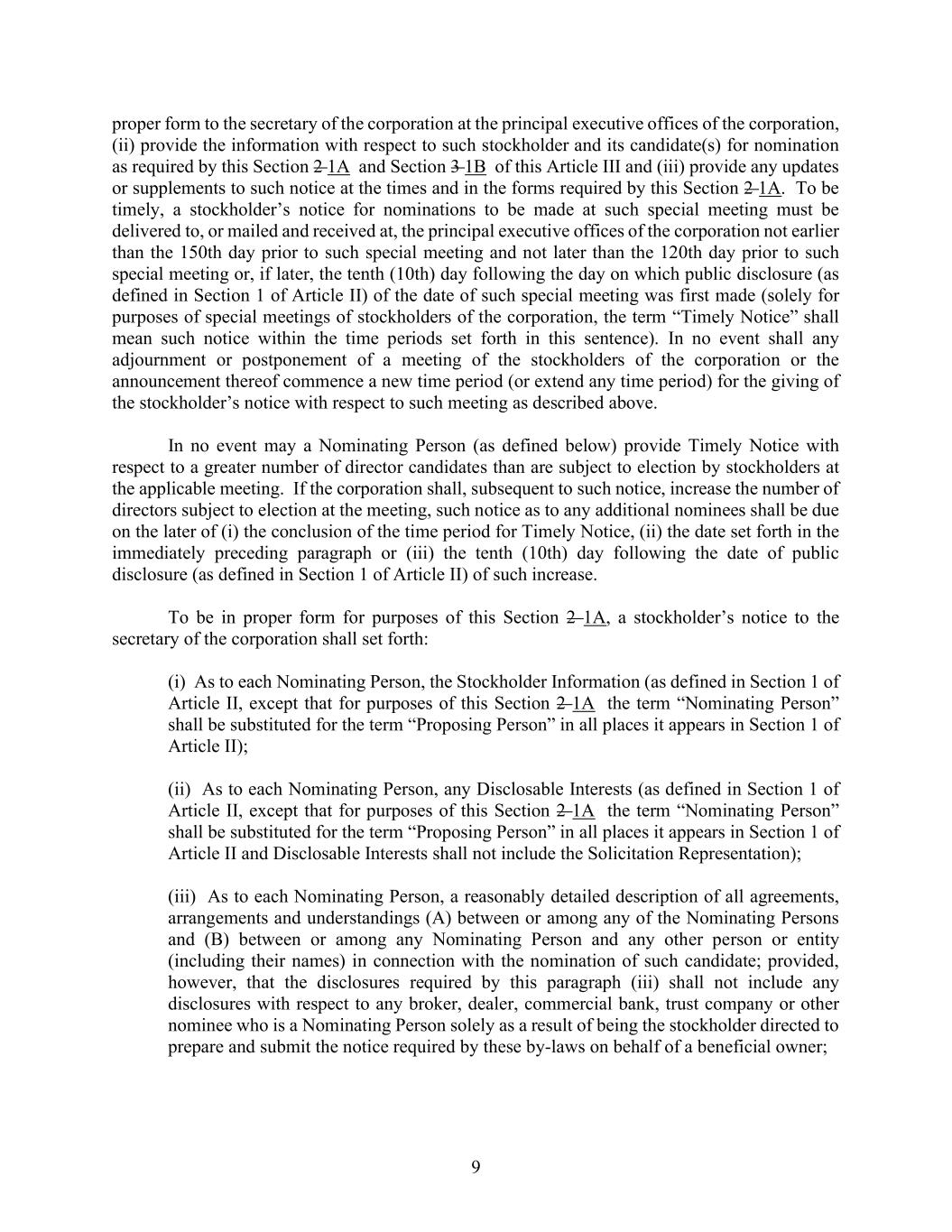
9 proper form to the secretary of the corporation at the principal executive offices of the corporation, (ii) provide the information with respect to such stockholder and its candidate(s) for nomination as required by this Section 2 1A and Section 3 1B of this Article III and (iii) provide any updates or supplements to such notice at the times and in the forms required by this Section 2 1A. To be timely, a stockholder’s notice for nominations to be made at such special meeting must be delivered to, or mailed and received at, the principal executive offices of the corporation not earlier than the 150th day prior to such special meeting and not later than the 120th day prior to such special meeting or, if later, the tenth (10th) day following the day on which public disclosure (as defined in Section 1 of Article II) of the date of such special meeting was first made (solely for purposes of special meetings of stockholders of the corporation, the term “Timely Notice” shall mean such notice within the time periods set forth in this sentence). In no event shall any adjournment or postponement of a meeting of the stockholders of the corporation or the announcement thereof commence a new time period (or extend any time period) for the giving of the stockholder’s notice with respect to such meeting as described above. In no event may a Nominating Person (as defined below) provide Timely Notice with respect to a greater number of director candidates than are subject to election by stockholders at the applicable meeting. If the corporation shall, subsequent to such notice, increase the number of directors subject to election at the meeting, such notice as to any additional nominees shall be due on the later of (i) the conclusion of the time period for Timely Notice, (ii) the date set forth in the immediately preceding paragraph or (iii) the tenth (10th) day following the date of public disclosure (as defined in Section 1 of Article II) of such increase. To be in proper form for purposes of this Section 2 1A, a stockholder’s notice to the secretary of the corporation shall set forth: (i) As to each Nominating Person, the Stockholder Information (as defined in Section 1 of Article II, except that for purposes of this Section 2 1A the term “Nominating Person” shall be substituted for the term “Proposing Person” in all places it appears in Section 1 of Article II); (ii) As to each Nominating Person, any Disclosable Interests (as defined in Section 1 of Article II, except that for purposes of this Section 2 1A the term “Nominating Person” shall be substituted for the term “Proposing Person” in all places it appears in Section 1 of Article II and Disclosable Interests shall not include the Solicitation Representation); (iii) As to each Nominating Person, a reasonably detailed description of all agreements, arrangements and understandings (A) between or among any of the Nominating Persons and (B) between or among any Nominating Person and any other person or entity (including their names) in connection with the nomination of such candidate; provided, however, that the disclosures required by this paragraph (iii) shall not include any disclosures with respect to any broker, dealer, commercial bank, trust company or other nominee who is a Nominating Person solely as a result of being the stockholder directed to prepare and submit the notice required by these by-laws on behalf of a beneficial owner;
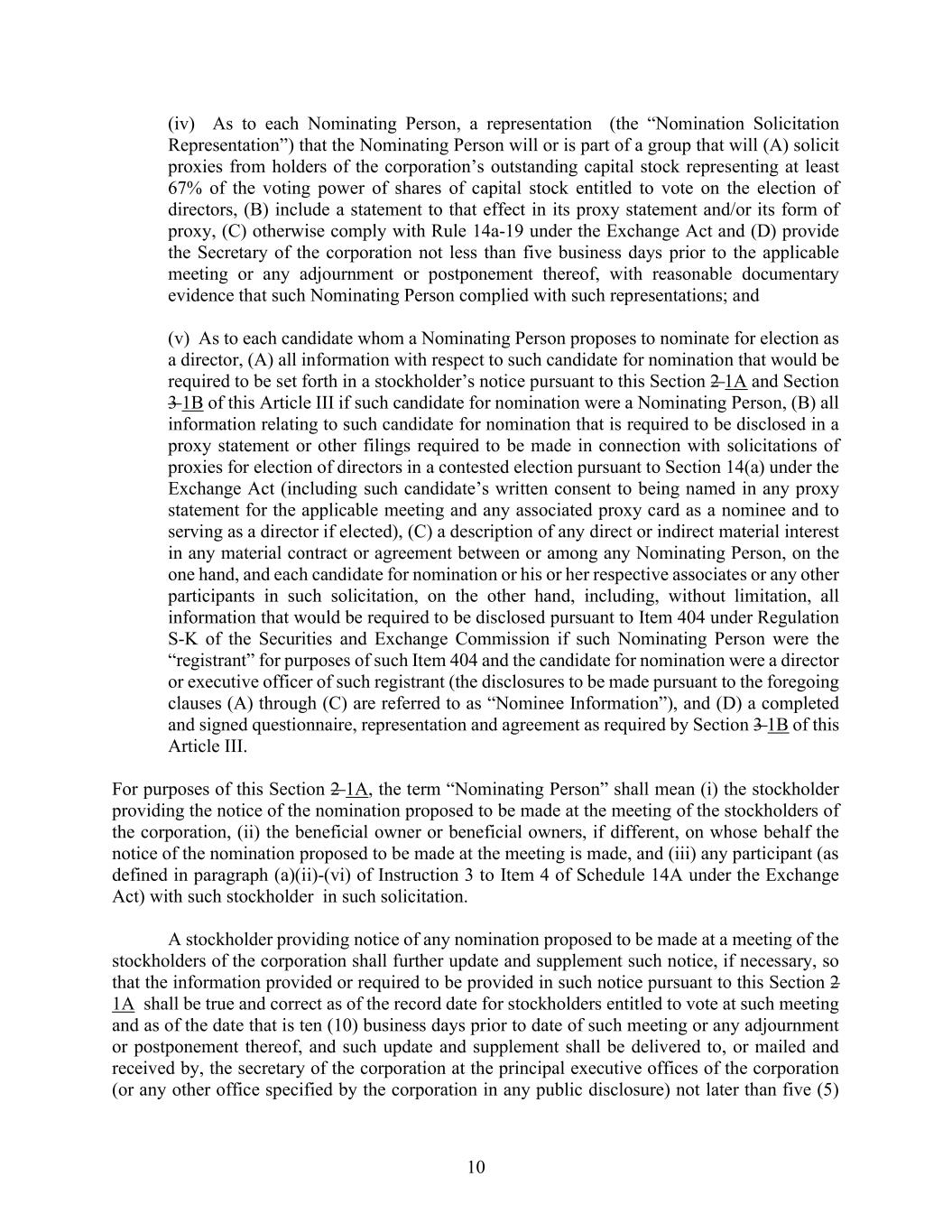
10 (iv) As to each Nominating Person, a representation (the “Nomination Solicitation Representation”) that the Nominating Person will or is part of a group that will (A) solicit proxies from holders of the corporation’s outstanding capital stock representing at least 67% of the voting power of shares of capital stock entitled to vote on the election of directors, (B) include a statement to that effect in its proxy statement and/or its form of proxy, (C) otherwise comply with Rule 14a-19 under the Exchange Act and (D) provide the Secretary of the corporation not less than five business days prior to the applicable meeting or any adjournment or postponement thereof, with reasonable documentary evidence that such Nominating Person complied with such representations; and (v) As to each candidate whom a Nominating Person proposes to nominate for election as a director, (A) all information with respect to such candidate for nomination that would be required to be set forth in a stockholder’s notice pursuant to this Section 2 1A and Section 3 1B of this Article III if such candidate for nomination were a Nominating Person, (B) all information relating to such candidate for nomination that is required to be disclosed in a proxy statement or other filings required to be made in connection with solicitations of proxies for election of directors in a contested election pursuant to Section 14(a) under the Exchange Act (including such candidate’s written consent to being named in any proxy statement for the applicable meeting and any associated proxy card as a nominee and to serving as a director if elected), (C) a description of any direct or indirect material interest in any material contract or agreement between or among any Nominating Person, on the one hand, and each candidate for nomination or his or her respective associates or any other participants in such solicitation, on the other hand, including, without limitation, all information that would be required to be disclosed pursuant to Item 404 under Regulation S-K of the Securities and Exchange Commission if such Nominating Person were the “registrant” for purposes of such Item 404 and the candidate for nomination were a director or executive officer of such registrant (the disclosures to be made pursuant to the foregoing clauses (A) through (C) are referred to as “Nominee Information”), and (D) a completed and signed questionnaire, representation and agreement as required by Section 3 1B of this Article III. For purposes of this Section 2 1A, the term “Nominating Person” shall mean (i) the stockholder providing the notice of the nomination proposed to be made at the meeting of the stockholders of the corporation, (ii) the beneficial owner or beneficial owners, if different, on whose behalf the notice of the nomination proposed to be made at the meeting is made, and (iii) any participant (as defined in paragraph (a)(ii)-(vi) of Instruction 3 to Item 4 of Schedule 14A under the Exchange Act) with such stockholder in such solicitation. A stockholder providing notice of any nomination proposed to be made at a meeting of the stockholders of the corporation shall further update and supplement such notice, if necessary, so that the information provided or required to be provided in such notice pursuant to this Section 2 1A shall be true and correct as of the record date for stockholders entitled to vote at such meeting and as of the date that is ten (10) business days prior to date of such meeting or any adjournment or postponement thereof, and such update and supplement shall be delivered to, or mailed and received by, the secretary of the corporation at the principal executive offices of the corporation (or any other office specified by the corporation in any public disclosure) not later than five (5)
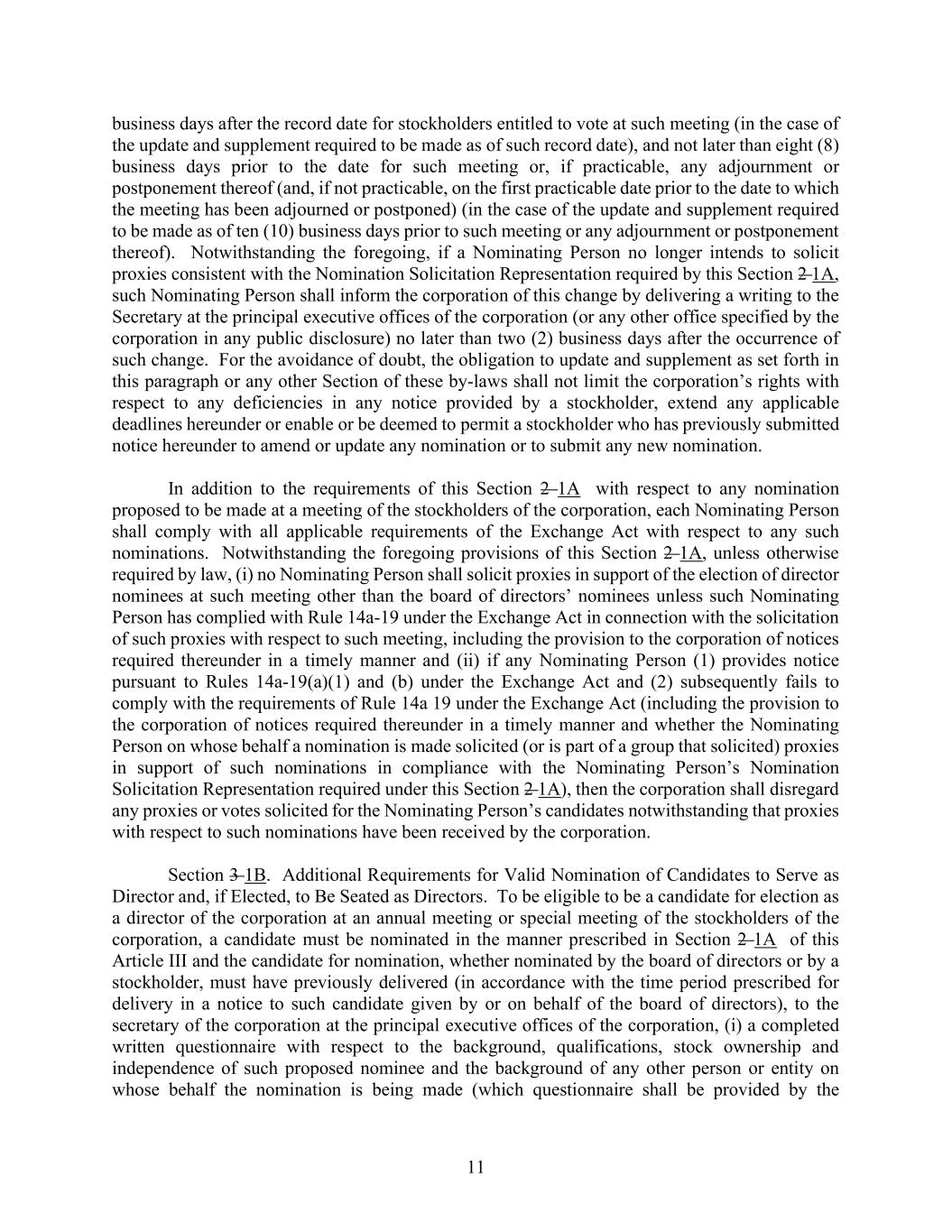
11 business days after the record date for stockholders entitled to vote at such meeting (in the case of the update and supplement required to be made as of such record date), and not later than eight (8) business days prior to the date for such meeting or, if practicable, any adjournment or postponement thereof (and, if not practicable, on the first practicable date prior to the date to which the meeting has been adjourned or postponed) (in the case of the update and supplement required to be made as of ten (10) business days prior to such meeting or any adjournment or postponement thereof). Notwithstanding the foregoing, if a Nominating Person no longer intends to solicit proxies consistent with the Nomination Solicitation Representation required by this Section 2 1A, such Nominating Person shall inform the corporation of this change by delivering a writing to the Secretary at the principal executive offices of the corporation (or any other office specified by the corporation in any public disclosure) no later than two (2) business days after the occurrence of such change. For the avoidance of doubt, the obligation to update and supplement as set forth in this paragraph or any other Section of these by-laws shall not limit the corporation’s rights with respect to any deficiencies in any notice provided by a stockholder, extend any applicable deadlines hereunder or enable or be deemed to permit a stockholder who has previously submitted notice hereunder to amend or update any nomination or to submit any new nomination. In addition to the requirements of this Section 2 1A with respect to any nomination proposed to be made at a meeting of the stockholders of the corporation, each Nominating Person shall comply with all applicable requirements of the Exchange Act with respect to any such nominations. Notwithstanding the foregoing provisions of this Section 2 1A, unless otherwise required by law, (i) no Nominating Person shall solicit proxies in support of the election of director nominees at such meeting other than the board of directors’ nominees unless such Nominating Person has complied with Rule 14a-19 under the Exchange Act in connection with the solicitation of such proxies with respect to such meeting, including the provision to the corporation of notices required thereunder in a timely manner and (ii) if any Nominating Person (1) provides notice pursuant to Rules 14a-19(a)(1) and (b) under the Exchange Act and (2) subsequently fails to comply with the requirements of Rule 14a 19 under the Exchange Act (including the provision to the corporation of notices required thereunder in a timely manner and whether the Nominating Person on whose behalf a nomination is made solicited (or is part of a group that solicited) proxies in support of such nominations in compliance with the Nominating Person’s Nomination Solicitation Representation required under this Section 2 1A), then the corporation shall disregard any proxies or votes solicited for the Nominating Person’s candidates notwithstanding that proxies with respect to such nominations have been received by the corporation. Section 3 1B. Additional Requirements for Valid Nomination of Candidates to Serve as Director and, if Elected, to Be Seated as Directors. To be eligible to be a candidate for election as a director of the corporation at an annual meeting or special meeting of the stockholders of the corporation, a candidate must be nominated in the manner prescribed in Section 2 1A of this Article III and the candidate for nomination, whether nominated by the board of directors or by a stockholder, must have previously delivered (in accordance with the time period prescribed for delivery in a notice to such candidate given by or on behalf of the board of directors), to the secretary of the corporation at the principal executive offices of the corporation, (i) a completed written questionnaire with respect to the background, qualifications, stock ownership and independence of such proposed nominee and the background of any other person or entity on whose behalf the nomination is being made (which questionnaire shall be provided by the
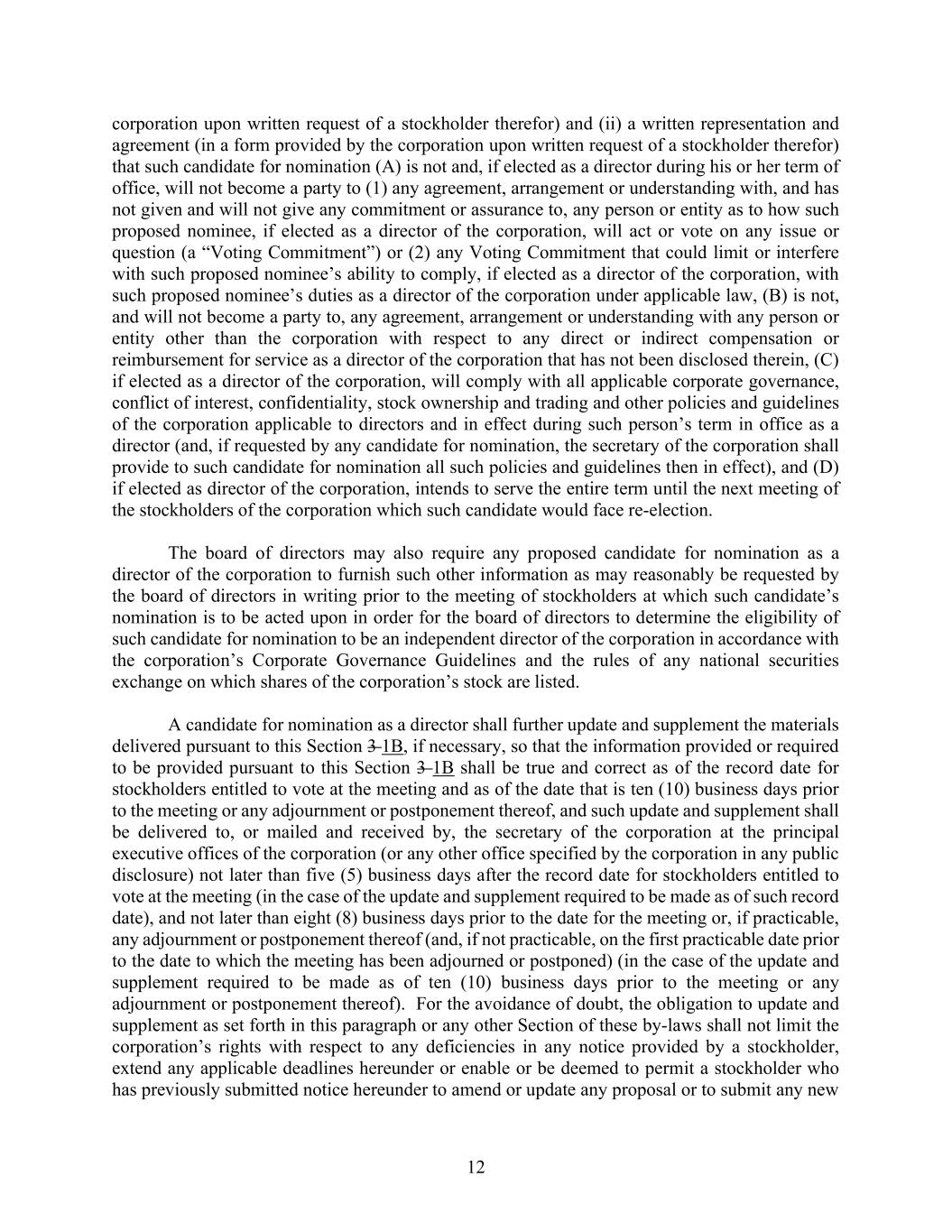
12 corporation upon written request of a stockholder therefor) and (ii) a written representation and agreement (in a form provided by the corporation upon written request of a stockholder therefor) that such candidate for nomination (A) is not and, if elected as a director during his or her term of office, will not become a party to (1) any agreement, arrangement or understanding with, and has not given and will not give any commitment or assurance to, any person or entity as to how such proposed nominee, if elected as a director of the corporation, will act or vote on any issue or question (a “Voting Commitment”) or (2) any Voting Commitment that could limit or interfere with such proposed nominee’s ability to comply, if elected as a director of the corporation, with such proposed nominee’s duties as a director of the corporation under applicable law, (B) is not, and will not become a party to, any agreement, arrangement or understanding with any person or entity other than the corporation with respect to any direct or indirect compensation or reimbursement for service as a director of the corporation that has not been disclosed therein, (C) if elected as a director of the corporation, will comply with all applicable corporate governance, conflict of interest, confidentiality, stock ownership and trading and other policies and guidelines of the corporation applicable to directors and in effect during such person’s term in office as a director (and, if requested by any candidate for nomination, the secretary of the corporation shall provide to such candidate for nomination all such policies and guidelines then in effect), and (D) if elected as director of the corporation, intends to serve the entire term until the next meeting of the stockholders of the corporation which such candidate would face re-election. The board of directors may also require any proposed candidate for nomination as a director of the corporation to furnish such other information as may reasonably be requested by the board of directors in writing prior to the meeting of stockholders at which such candidate’s nomination is to be acted upon in order for the board of directors to determine the eligibility of such candidate for nomination to be an independent director of the corporation in accordance with the corporation’s Corporate Governance Guidelines and the rules of any national securities exchange on which shares of the corporation’s stock are listed. A candidate for nomination as a director shall further update and supplement the materials delivered pursuant to this Section 3 1B, if necessary, so that the information provided or required to be provided pursuant to this Section 3 1B shall be true and correct as of the record date for stockholders entitled to vote at the meeting and as of the date that is ten (10) business days prior to the meeting or any adjournment or postponement thereof, and such update and supplement shall be delivered to, or mailed and received by, the secretary of the corporation at the principal executive offices of the corporation (or any other office specified by the corporation in any public disclosure) not later than five (5) business days after the record date for stockholders entitled to vote at the meeting (in the case of the update and supplement required to be made as of such record date), and not later than eight (8) business days prior to the date for the meeting or, if practicable, any adjournment or postponement thereof (and, if not practicable, on the first practicable date prior to the date to which the meeting has been adjourned or postponed) (in the case of the update and supplement required to be made as of ten (10) business days prior to the meeting or any adjournment or postponement thereof). For the avoidance of doubt, the obligation to update and supplement as set forth in this paragraph or any other Section of these by-laws shall not limit the corporation’s rights with respect to any deficiencies in any notice provided by a stockholder, extend any applicable deadlines hereunder or enable or be deemed to permit a stockholder who has previously submitted notice hereunder to amend or update any proposal or to submit any new
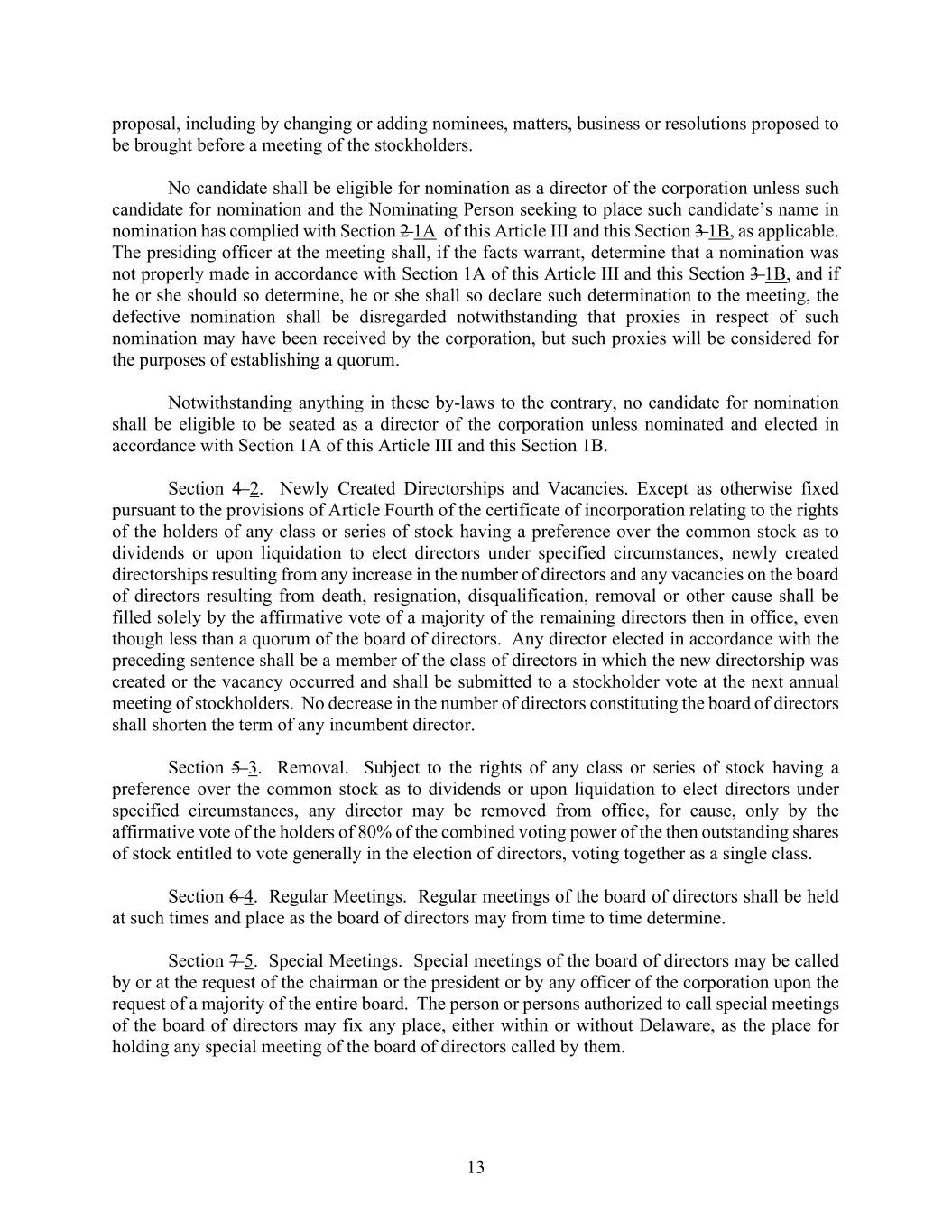
13 proposal, including by changing or adding nominees, matters, business or resolutions proposed to be brought before a meeting of the stockholders. No candidate shall be eligible for nomination as a director of the corporation unless such candidate for nomination and the Nominating Person seeking to place such candidate’s name in nomination has complied with Section 2 1A of this Article III and this Section 3 1B, as applicable. The presiding officer at the meeting shall, if the facts warrant, determine that a nomination was not properly made in accordance with Section 1A of this Article III and this Section 3 1B, and if he or she should so determine, he or she shall so declare such determination to the meeting, the defective nomination shall be disregarded notwithstanding that proxies in respect of such nomination may have been received by the corporation, but such proxies will be considered for the purposes of establishing a quorum. Notwithstanding anything in these by-laws to the contrary, no candidate for nomination shall be eligible to be seated as a director of the corporation unless nominated and elected in accordance with Section 1A of this Article III and this Section 1B. Section 4 2. Newly Created Directorships and Vacancies. Except as otherwise fixed pursuant to the provisions of Article Fourth of the certificate of incorporation relating to the rights of the holders of any class or series of stock having a preference over the common stock as to dividends or upon liquidation to elect directors under specified circumstances, newly created directorships resulting from any increase in the number of directors and any vacancies on the board of directors resulting from death, resignation, disqualification, removal or other cause shall be filled solely by the affirmative vote of a majority of the remaining directors then in office, even though less than a quorum of the board of directors. Any director elected in accordance with the preceding sentence shall be a member of the class of directors in which the new directorship was created or the vacancy occurred and shall be submitted to a stockholder vote at the next annual meeting of stockholders. No decrease in the number of directors constituting the board of directors shall shorten the term of any incumbent director. Section 5 3. Removal. Subject to the rights of any class or series of stock having a preference over the common stock as to dividends or upon liquidation to elect directors under specified circumstances, any director may be removed from office, for cause, only by the affirmative vote of the holders of 80% of the combined voting power of the then outstanding shares of stock entitled to vote generally in the election of directors, voting together as a single class. Section 6 4. Regular Meetings. Regular meetings of the board of directors shall be held at such times and place as the board of directors may from time to time determine. Section 7 5. Special Meetings. Special meetings of the board of directors may be called by or at the request of the chairman or the president or by any officer of the corporation upon the request of a majority of the entire board. The person or persons authorized to call special meetings of the board of directors may fix any place, either within or without Delaware, as the place for holding any special meeting of the board of directors called by them.
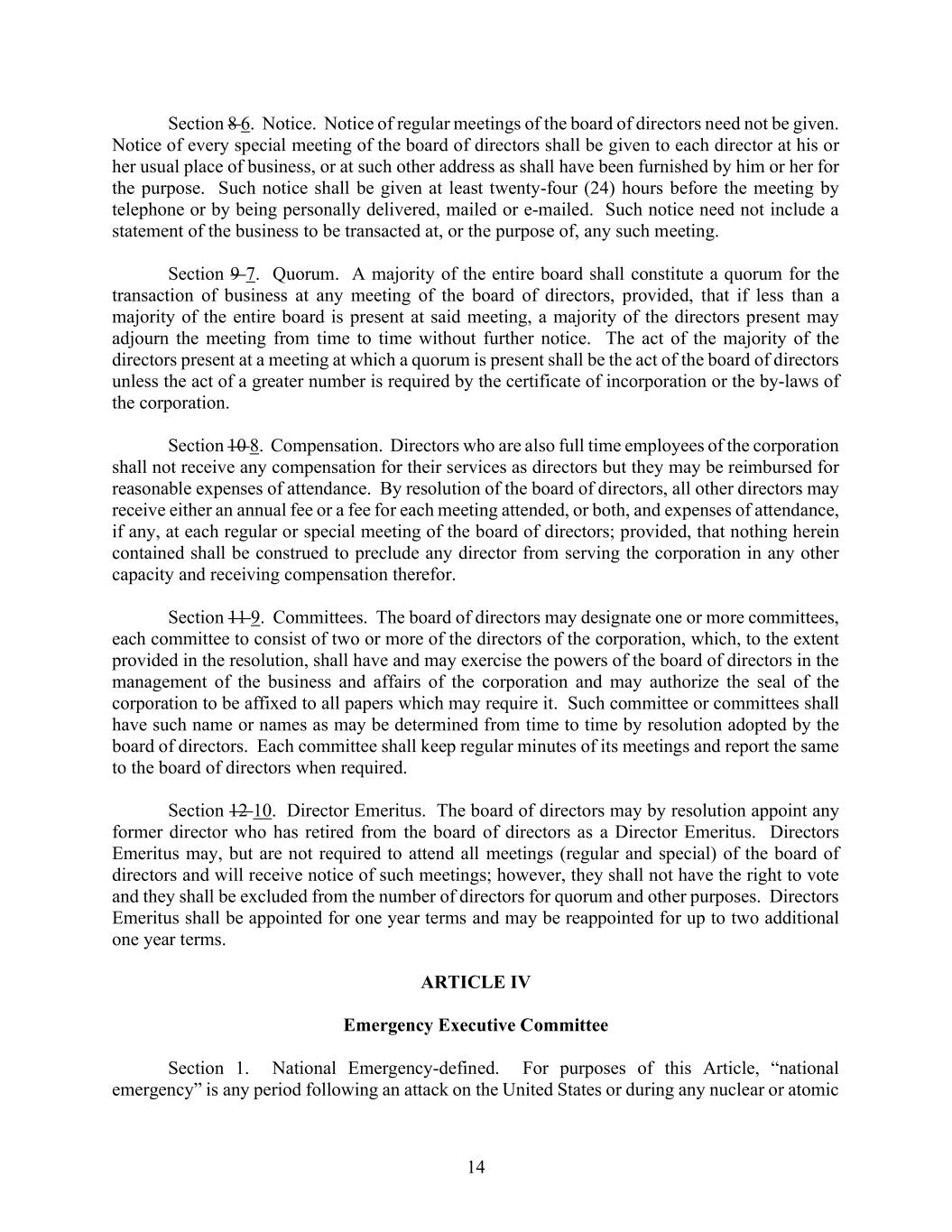
14 Section 8 6. Notice. Notice of regular meetings of the board of directors need not be given. Notice of every special meeting of the board of directors shall be given to each director at his or her usual place of business, or at such other address as shall have been furnished by him or her for the purpose. Such notice shall be given at least twenty-four (24) hours before the meeting by telephone or by being personally delivered, mailed or e-mailed. Such notice need not include a statement of the business to be transacted at, or the purpose of, any such meeting. Section 9 7. Quorum. A majority of the entire board shall constitute a quorum for the transaction of business at any meeting of the board of directors, provided, that if less than a majority of the entire board is present at said meeting, a majority of the directors present may adjourn the meeting from time to time without further notice. The act of the majority of the directors present at a meeting at which a quorum is present shall be the act of the board of directors unless the act of a greater number is required by the certificate of incorporation or the by-laws of the corporation. Section 10 8. Compensation. Directors who are also full time employees of the corporation shall not receive any compensation for their services as directors but they may be reimbursed for reasonable expenses of attendance. By resolution of the board of directors, all other directors may receive either an annual fee or a fee for each meeting attended, or both, and expenses of attendance, if any, at each regular or special meeting of the board of directors; provided, that nothing herein contained shall be construed to preclude any director from serving the corporation in any other capacity and receiving compensation therefor. Section 11 9. Committees. The board of directors may designate one or more committees, each committee to consist of two or more of the directors of the corporation, which, to the extent provided in the resolution, shall have and may exercise the powers of the board of directors in the management of the business and affairs of the corporation and may authorize the seal of the corporation to be affixed to all papers which may require it. Such committee or committees shall have such name or names as may be determined from time to time by resolution adopted by the board of directors. Each committee shall keep regular minutes of its meetings and report the same to the board of directors when required. Section 12 10. Director Emeritus. The board of directors may by resolution appoint any former director who has retired from the board of directors as a Director Emeritus. Directors Emeritus may, but are not required to attend all meetings (regular and special) of the board of directors and will receive notice of such meetings; however, they shall not have the right to vote and they shall be excluded from the number of directors for quorum and other purposes. Directors Emeritus shall be appointed for one year terms and may be reappointed for up to two additional one year terms. ARTICLE IV Emergency Executive Committee Section 1. National Emergency-defined. For purposes of this Article, “national emergency” is any period following an attack on the United States or during any nuclear or atomic
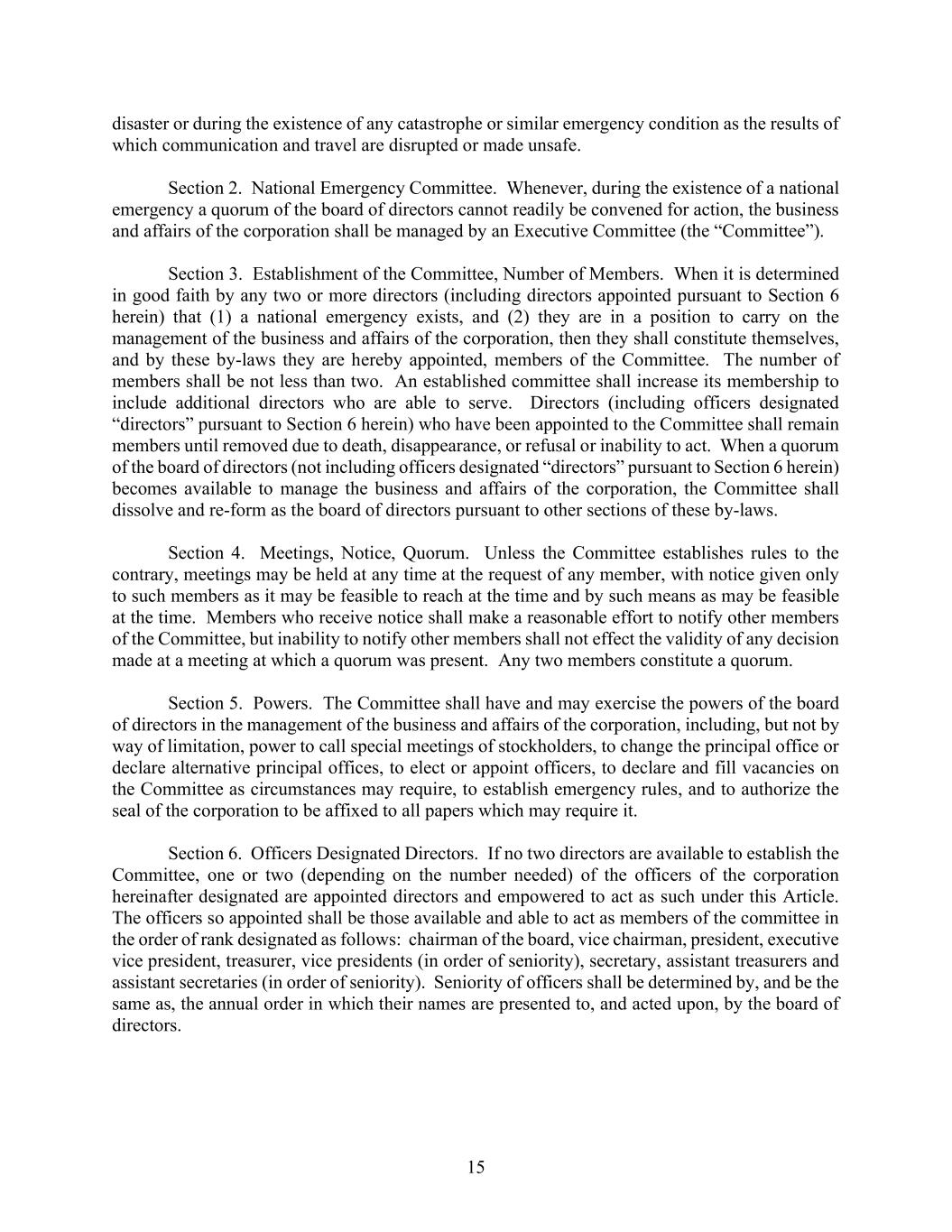
15 disaster or during the existence of any catastrophe or similar emergency condition as the results of which communication and travel are disrupted or made unsafe. Section 2. National Emergency Committee. Whenever, during the existence of a national emergency a quorum of the board of directors cannot readily be convened for action, the business and affairs of the corporation shall be managed by an Executive Committee (the “Committee”). Section 3. Establishment of the Committee, Number of Members. When it is determined in good faith by any two or more directors (including directors appointed pursuant to Section 6 herein) that (1) a national emergency exists, and (2) they are in a position to carry on the management of the business and affairs of the corporation, then they shall constitute themselves, and by these by-laws they are hereby appointed, members of the Committee. The number of members shall be not less than two. An established committee shall increase its membership to include additional directors who are able to serve. Directors (including officers designated “directors” pursuant to Section 6 herein) who have been appointed to the Committee shall remain members until removed due to death, disappearance, or refusal or inability to act. When a quorum of the board of directors (not including officers designated “directors” pursuant to Section 6 herein) becomes available to manage the business and affairs of the corporation, the Committee shall dissolve and re-form as the board of directors pursuant to other sections of these by-laws. Section 4. Meetings, Notice, Quorum. Unless the Committee establishes rules to the contrary, meetings may be held at any time at the request of any member, with notice given only to such members as it may be feasible to reach at the time and by such means as may be feasible at the time. Members who receive notice shall make a reasonable effort to notify other members of the Committee, but inability to notify other members shall not effect the validity of any decision made at a meeting at which a quorum was present. Any two members constitute a quorum. Section 5. Powers. The Committee shall have and may exercise the powers of the board of directors in the management of the business and affairs of the corporation, including, but not by way of limitation, power to call special meetings of stockholders, to change the principal office or declare alternative principal offices, to elect or appoint officers, to declare and fill vacancies on the Committee as circumstances may require, to establish emergency rules, and to authorize the seal of the corporation to be affixed to all papers which may require it. Section 6. Officers Designated Directors. If no two directors are available to establish the Committee, one or two (depending on the number needed) of the officers of the corporation hereinafter designated are appointed directors and empowered to act as such under this Article. The officers so appointed shall be those available and able to act as members of the committee in the order of rank designated as follows: chairman of the board, vice chairman, president, executive vice president, treasurer, vice presidents (in order of seniority), secretary, assistant treasurers and assistant secretaries (in order of seniority). Seniority of officers shall be determined by, and be the same as, the annual order in which their names are presented to, and acted upon, by the board of directors.
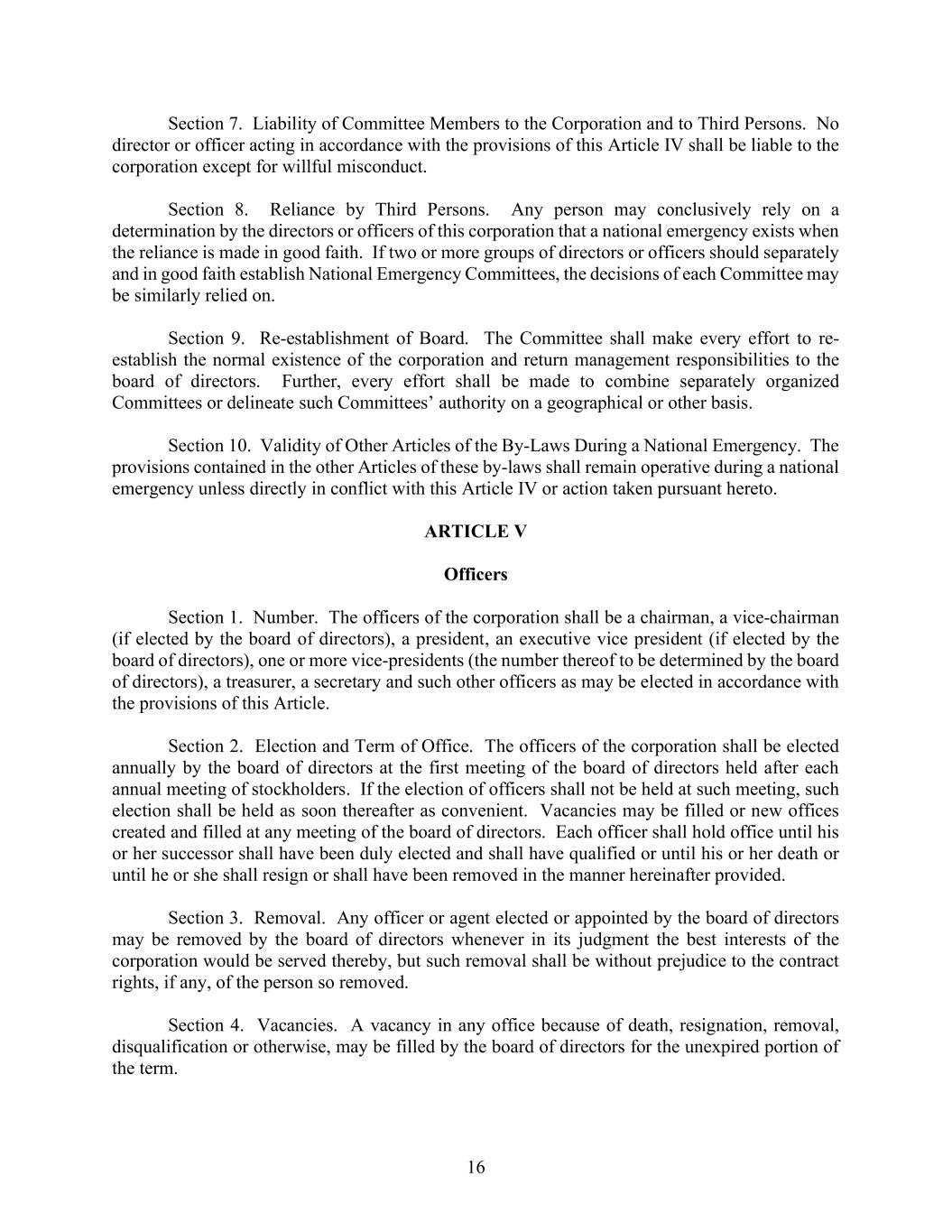
16 Section 7. Liability of Committee Members to the Corporation and to Third Persons. No director or officer acting in accordance with the provisions of this Article IV shall be liable to the corporation except for willful misconduct. Section 8. Reliance by Third Persons. Any person may conclusively rely on a determination by the directors or officers of this corporation that a national emergency exists when the reliance is made in good faith. If two or more groups of directors or officers should separately and in good faith establish National Emergency Committees, the decisions of each Committee may be similarly relied on. Section 9. Re-establishment of Board. The Committee shall make every effort to re- establish the normal existence of the corporation and return management responsibilities to the board of directors. Further, every effort shall be made to combine separately organized Committees or delineate such Committees’ authority on a geographical or other basis. Section 10. Validity of Other Articles of the By-Laws During a National Emergency. The provisions contained in the other Articles of these by-laws shall remain operative during a national emergency unless directly in conflict with this Article IV or action taken pursuant hereto. ARTICLE V Officers Section 1. Number. The officers of the corporation shall be a chairman, a vice-chairman (if elected by the board of directors), a president, an executive vice president (if elected by the board of directors), one or more vice-presidents (the number thereof to be determined by the board of directors), a treasurer, a secretary and such other officers as may be elected in accordance with the provisions of this Article. Section 2. Election and Term of Office. The officers of the corporation shall be elected annually by the board of directors at the first meeting of the board of directors held after each annual meeting of stockholders. If the election of officers shall not be held at such meeting, such election shall be held as soon thereafter as convenient. Vacancies may be filled or new offices created and filled at any meeting of the board of directors. Each officer shall hold office until his or her successor shall have been duly elected and shall have qualified or until his or her death or until he or she shall resign or shall have been removed in the manner hereinafter provided. Section 3. Removal. Any officer or agent elected or appointed by the board of directors may be removed by the board of directors whenever in its judgment the best interests of the corporation would be served thereby, but such removal shall be without prejudice to the contract rights, if any, of the person so removed. Section 4. Vacancies. A vacancy in any office because of death, resignation, removal, disqualification or otherwise, may be filled by the board of directors for the unexpired portion of the term.
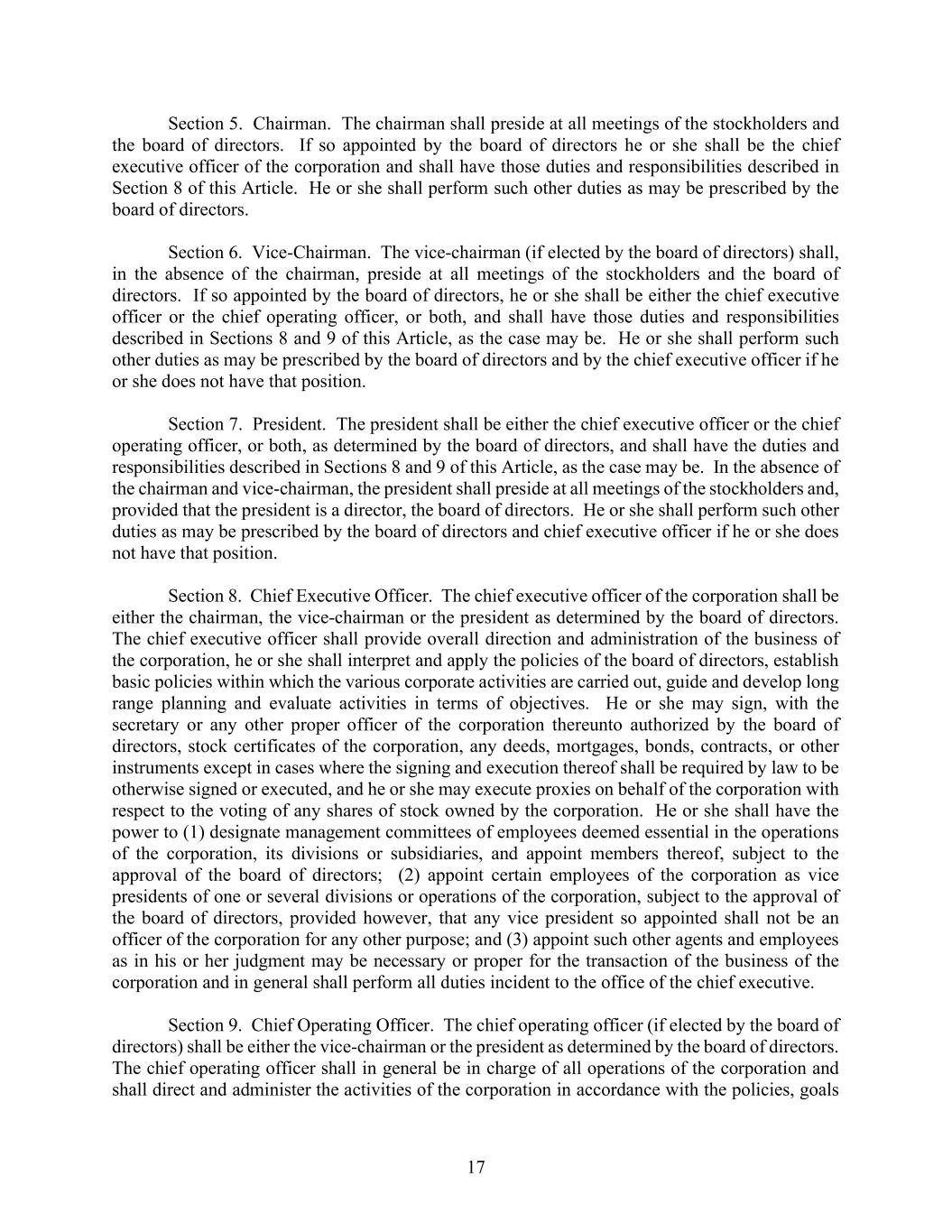
17 Section 5. Chairman. The chairman shall preside at all meetings of the stockholders and the board of directors. If so appointed by the board of directors he or she shall be the chief executive officer of the corporation and shall have those duties and responsibilities described in Section 8 of this Article. He or she shall perform such other duties as may be prescribed by the board of directors. Section 6. Vice-Chairman. The vice-chairman (if elected by the board of directors) shall, in the absence of the chairman, preside at all meetings of the stockholders and the board of directors. If so appointed by the board of directors, he or she shall be either the chief executive officer or the chief operating officer, or both, and shall have those duties and responsibilities described in Sections 8 and 9 of this Article, as the case may be. He or she shall perform such other duties as may be prescribed by the board of directors and by the chief executive officer if he or she does not have that position. Section 7. President. The president shall be either the chief executive officer or the chief operating officer, or both, as determined by the board of directors, and shall have the duties and responsibilities described in Sections 8 and 9 of this Article, as the case may be. In the absence of the chairman and vice-chairman, the president shall preside at all meetings of the stockholders and, provided that the president is a director, the board of directors. He or she shall perform such other duties as may be prescribed by the board of directors and chief executive officer if he or she does not have that position. Section 8. Chief Executive Officer. The chief executive officer of the corporation shall be either the chairman, the vice-chairman or the president as determined by the board of directors. The chief executive officer shall provide overall direction and administration of the business of the corporation, he or she shall interpret and apply the policies of the board of directors, establish basic policies within which the various corporate activities are carried out, guide and develop long range planning and evaluate activities in terms of objectives. He or she may sign, with the secretary or any other proper officer of the corporation thereunto authorized by the board of directors, stock certificates of the corporation, any deeds, mortgages, bonds, contracts, or other instruments except in cases where the signing and execution thereof shall be required by law to be otherwise signed or executed, and he or she may execute proxies on behalf of the corporation with respect to the voting of any shares of stock owned by the corporation. He or she shall have the power to (1) designate management committees of employees deemed essential in the operations of the corporation, its divisions or subsidiaries, and appoint members thereof, subject to the approval of the board of directors; (2) appoint certain employees of the corporation as vice presidents of one or several divisions or operations of the corporation, subject to the approval of the board of directors, provided however, that any vice president so appointed shall not be an officer of the corporation for any other purpose; and (3) appoint such other agents and employees as in his or her judgment may be necessary or proper for the transaction of the business of the corporation and in general shall perform all duties incident to the office of the chief executive. Section 9. Chief Operating Officer. The chief operating officer (if elected by the board of directors) shall be either the vice-chairman or the president as determined by the board of directors. The chief operating officer shall in general be in charge of all operations of the corporation and shall direct and administer the activities of the corporation in accordance with the policies, goals
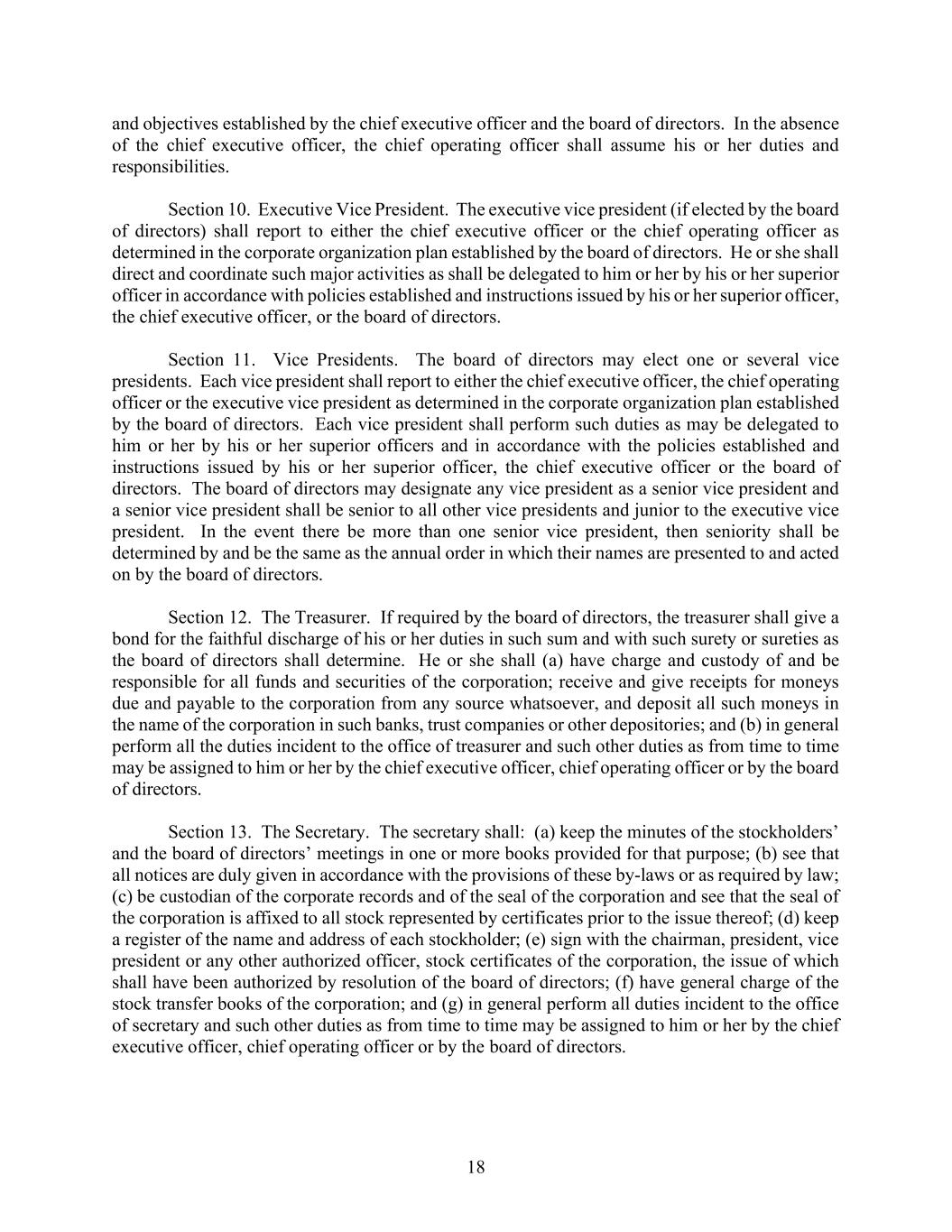
18 and objectives established by the chief executive officer and the board of directors. In the absence of the chief executive officer, the chief operating officer shall assume his or her duties and responsibilities. Section 10. Executive Vice President. The executive vice president (if elected by the board of directors) shall report to either the chief executive officer or the chief operating officer as determined in the corporate organization plan established by the board of directors. He or she shall direct and coordinate such major activities as shall be delegated to him or her by his or her superior officer in accordance with policies established and instructions issued by his or her superior officer, the chief executive officer, or the board of directors. Section 11. Vice Presidents. The board of directors may elect one or several vice presidents. Each vice president shall report to either the chief executive officer, the chief operating officer or the executive vice president as determined in the corporate organization plan established by the board of directors. Each vice president shall perform such duties as may be delegated to him or her by his or her superior officers and in accordance with the policies established and instructions issued by his or her superior officer, the chief executive officer or the board of directors. The board of directors may designate any vice president as a senior vice president and a senior vice president shall be senior to all other vice presidents and junior to the executive vice president. In the event there be more than one senior vice president, then seniority shall be determined by and be the same as the annual order in which their names are presented to and acted on by the board of directors. Section 12. The Treasurer. If required by the board of directors, the treasurer shall give a bond for the faithful discharge of his or her duties in such sum and with such surety or sureties as the board of directors shall determine. He or she shall (a) have charge and custody of and be responsible for all funds and securities of the corporation; receive and give receipts for moneys due and payable to the corporation from any source whatsoever, and deposit all such moneys in the name of the corporation in such banks, trust companies or other depositories; and (b) in general perform all the duties incident to the office of treasurer and such other duties as from time to time may be assigned to him or her by the chief executive officer, chief operating officer or by the board of directors. Section 13. The Secretary. The secretary shall: (a) keep the minutes of the stockholders’ and the board of directors’ meetings in one or more books provided for that purpose; (b) see that all notices are duly given in accordance with the provisions of these by-laws or as required by law; (c) be custodian of the corporate records and of the seal of the corporation and see that the seal of the corporation is affixed to all stock represented by certificates prior to the issue thereof; (d) keep a register of the name and address of each stockholder; (e) sign with the chairman, president, vice president or any other authorized officer, stock certificates of the corporation, the issue of which shall have been authorized by resolution of the board of directors; (f) have general charge of the stock transfer books of the corporation; and (g) in general perform all duties incident to the office of secretary and such other duties as from time to time may be assigned to him or her by the chief executive officer, chief operating officer or by the board of directors.
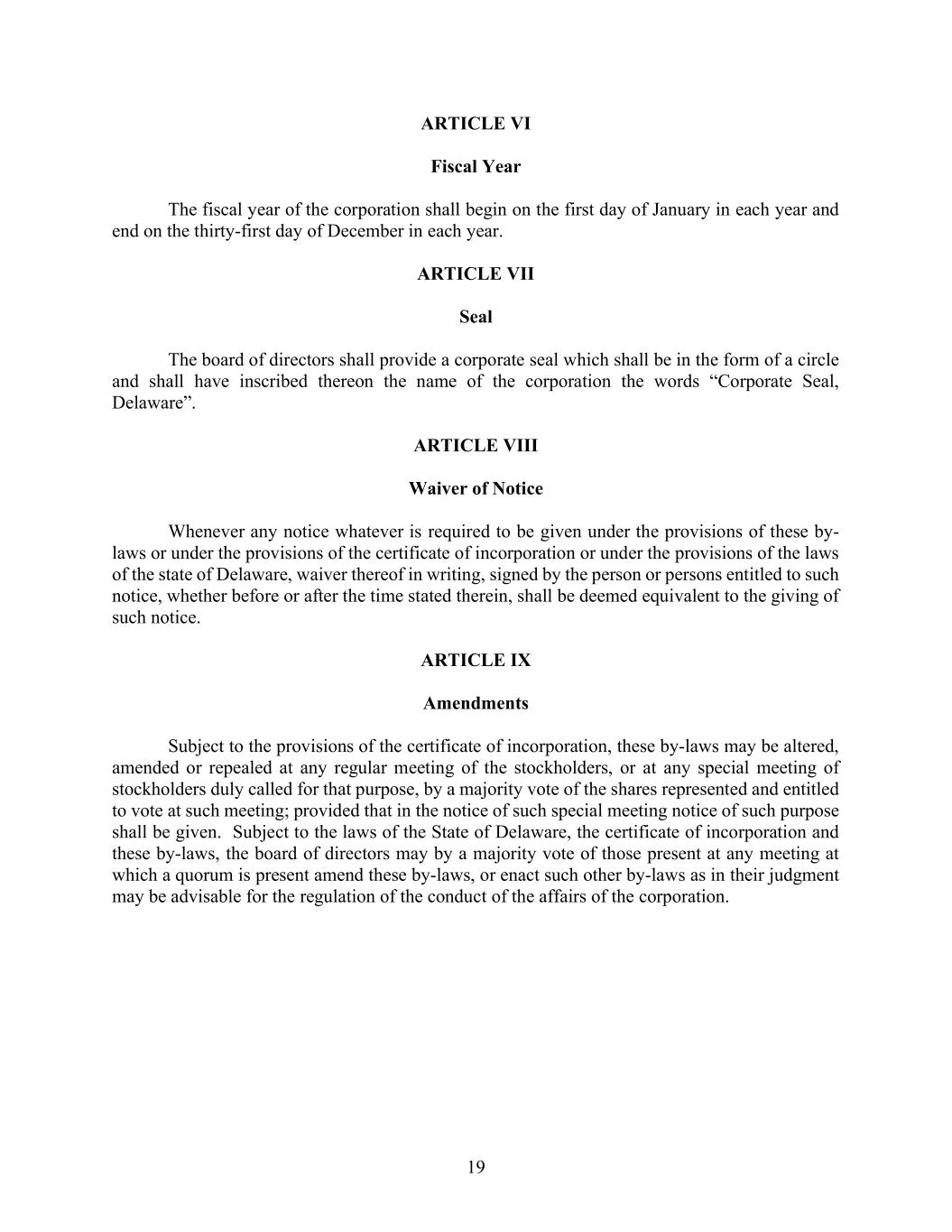
19 ARTICLE VI Fiscal Year The fiscal year of the corporation shall begin on the first day of January in each year and end on the thirty-first day of December in each year. ARTICLE VII Seal The board of directors shall provide a corporate seal which shall be in the form of a circle and shall have inscribed thereon the name of the corporation the words “Corporate Seal, Delaware”. ARTICLE VIII Waiver of Notice Whenever any notice whatever is required to be given under the provisions of these by- laws or under the provisions of the certificate of incorporation or under the provisions of the laws of the state of Delaware, waiver thereof in writing, signed by the person or persons entitled to such notice, whether before or after the time stated therein, shall be deemed equivalent to the giving of such notice. ARTICLE IX Amendments Subject to the provisions of the certificate of incorporation, these by-laws may be altered, amended or repealed at any regular meeting of the stockholders, or at any special meeting of stockholders duly called for that purpose, by a majority vote of the shares represented and entitled to vote at such meeting; provided that in the notice of such special meeting notice of such purpose shall be given. Subject to the laws of the State of Delaware, the certificate of incorporation and these by-laws, the board of directors may by a majority vote of those present at any meeting at which a quorum is present amend these by-laws, or enact such other by-laws as in their judgment may be advisable for the regulation of the conduct of the affairs of the corporation.